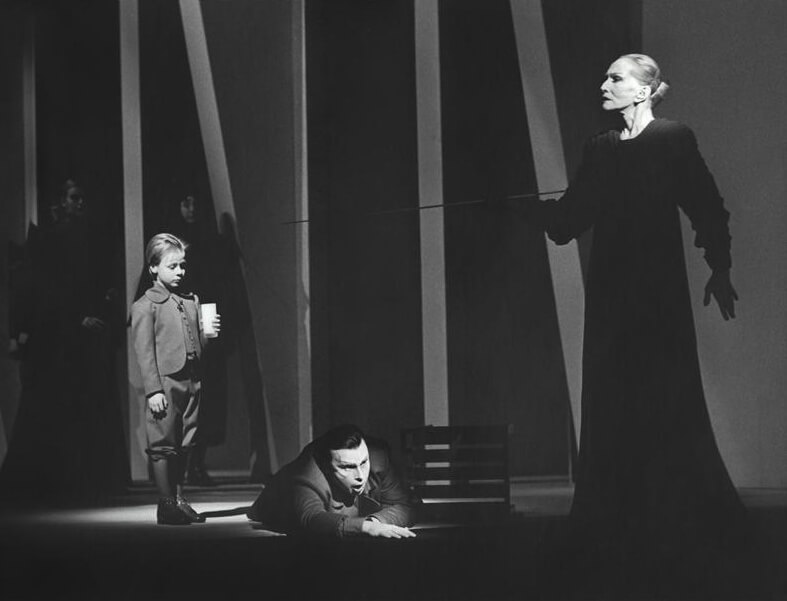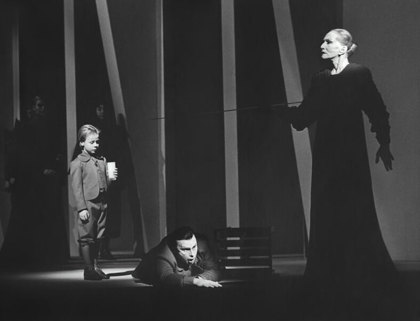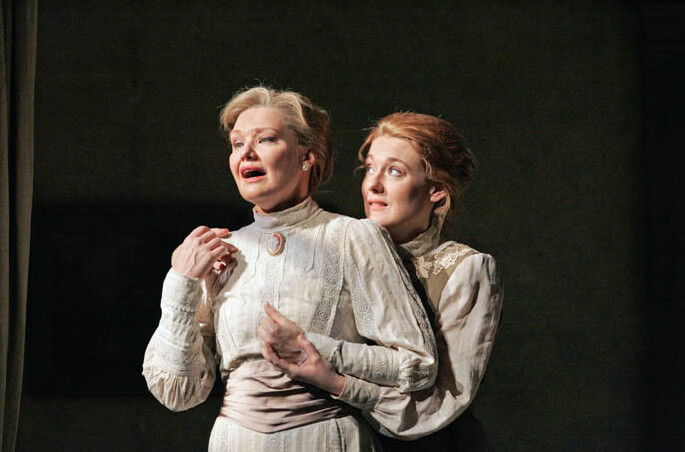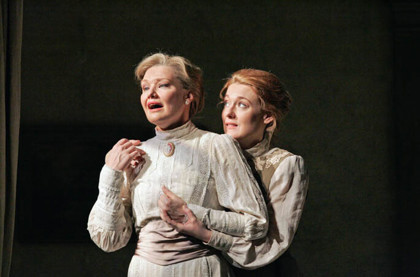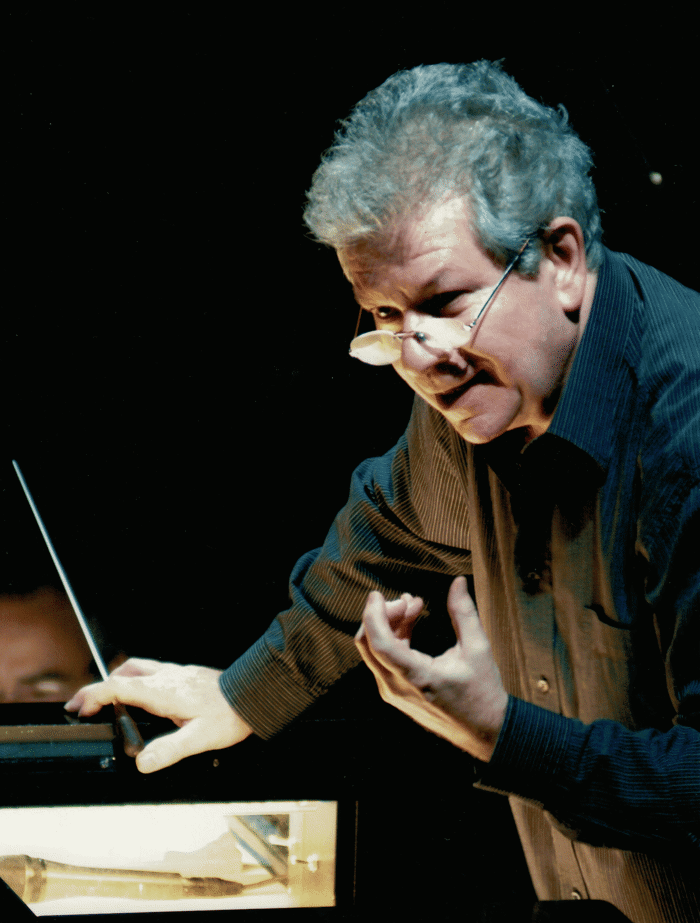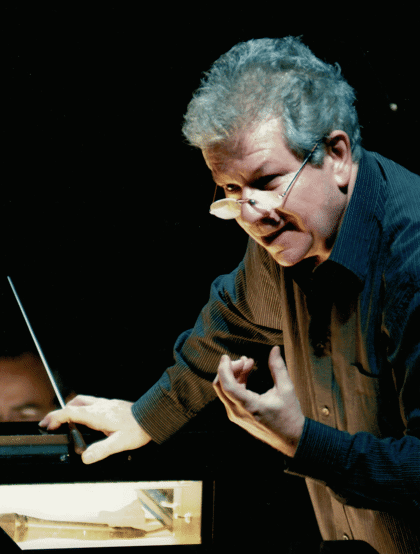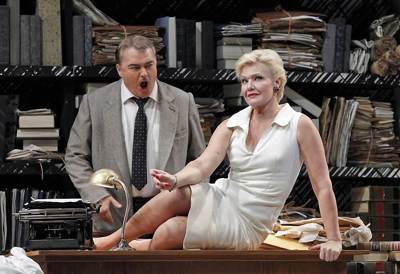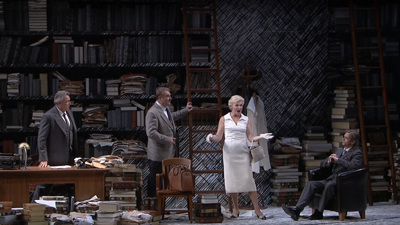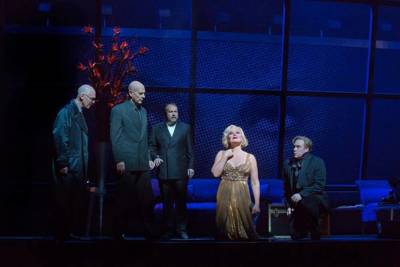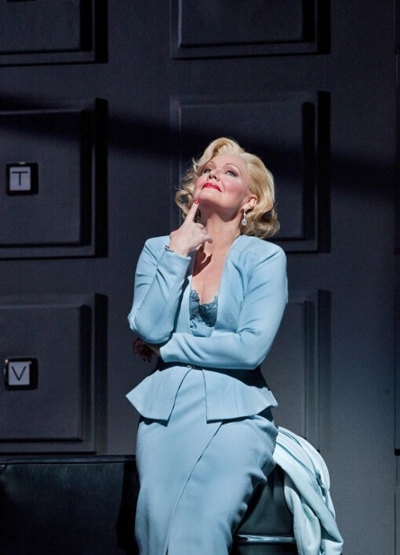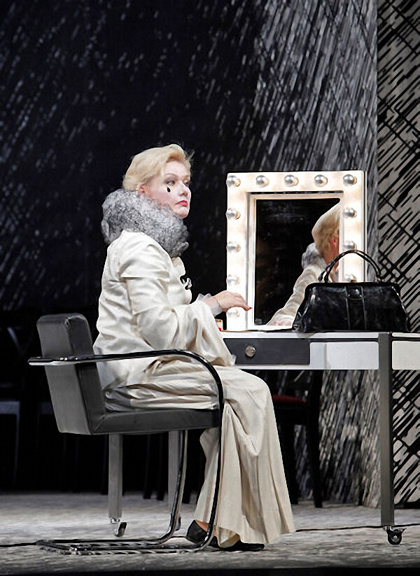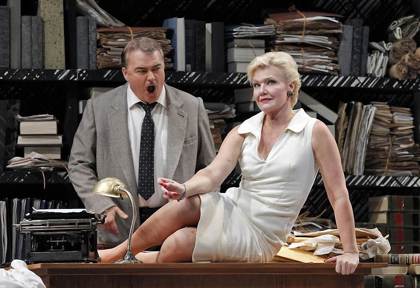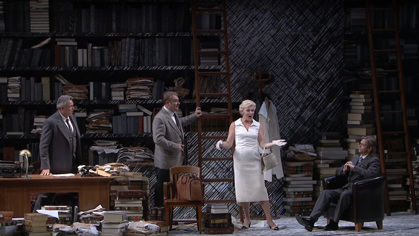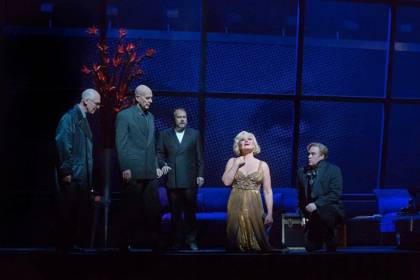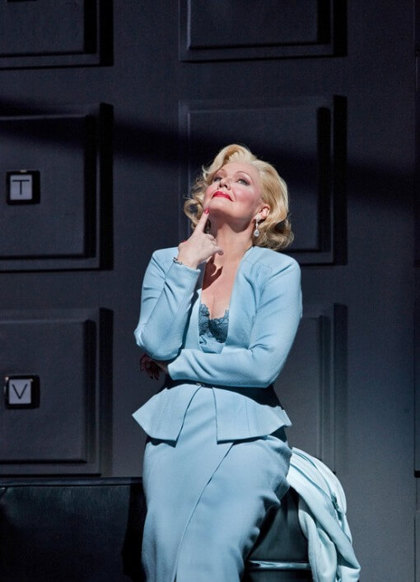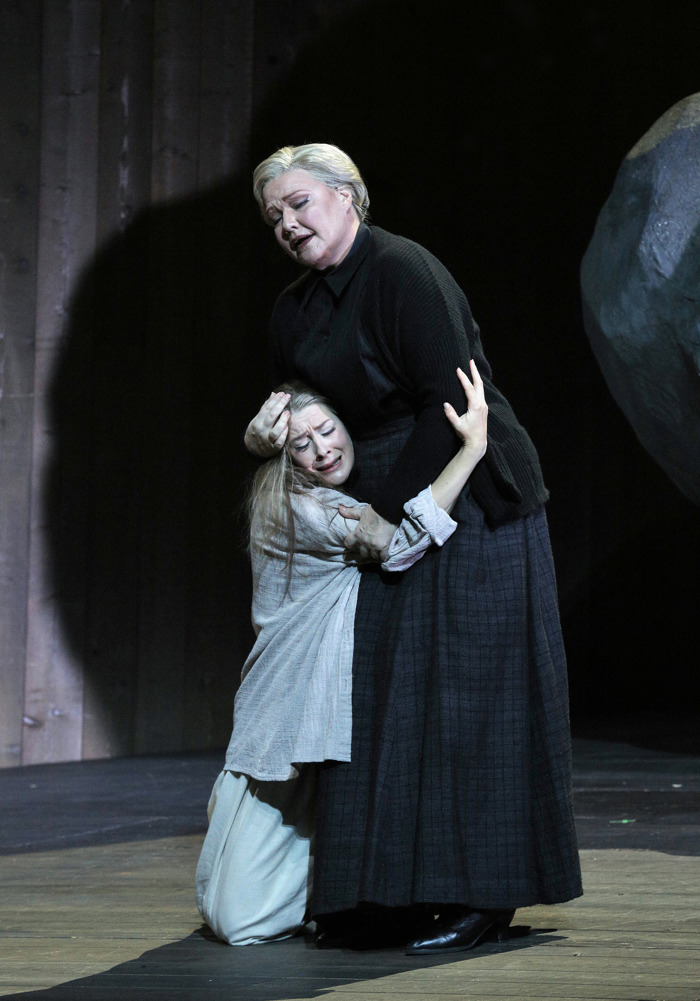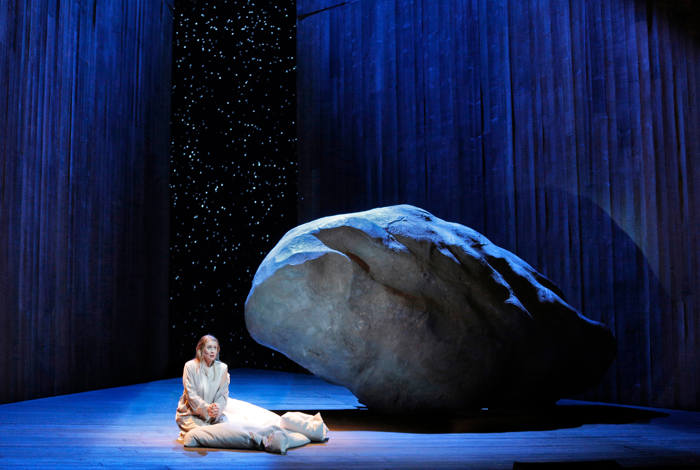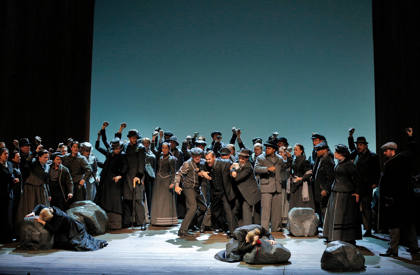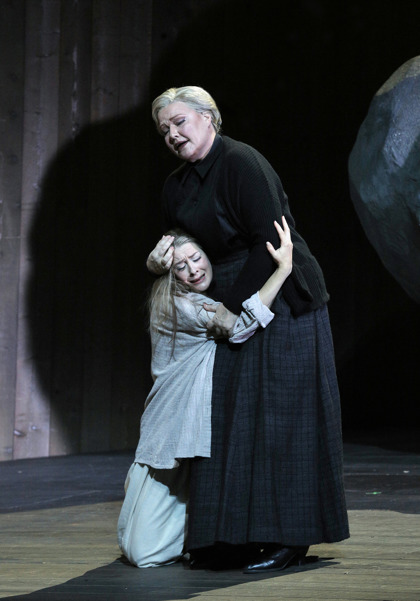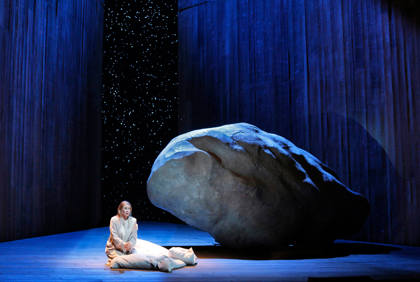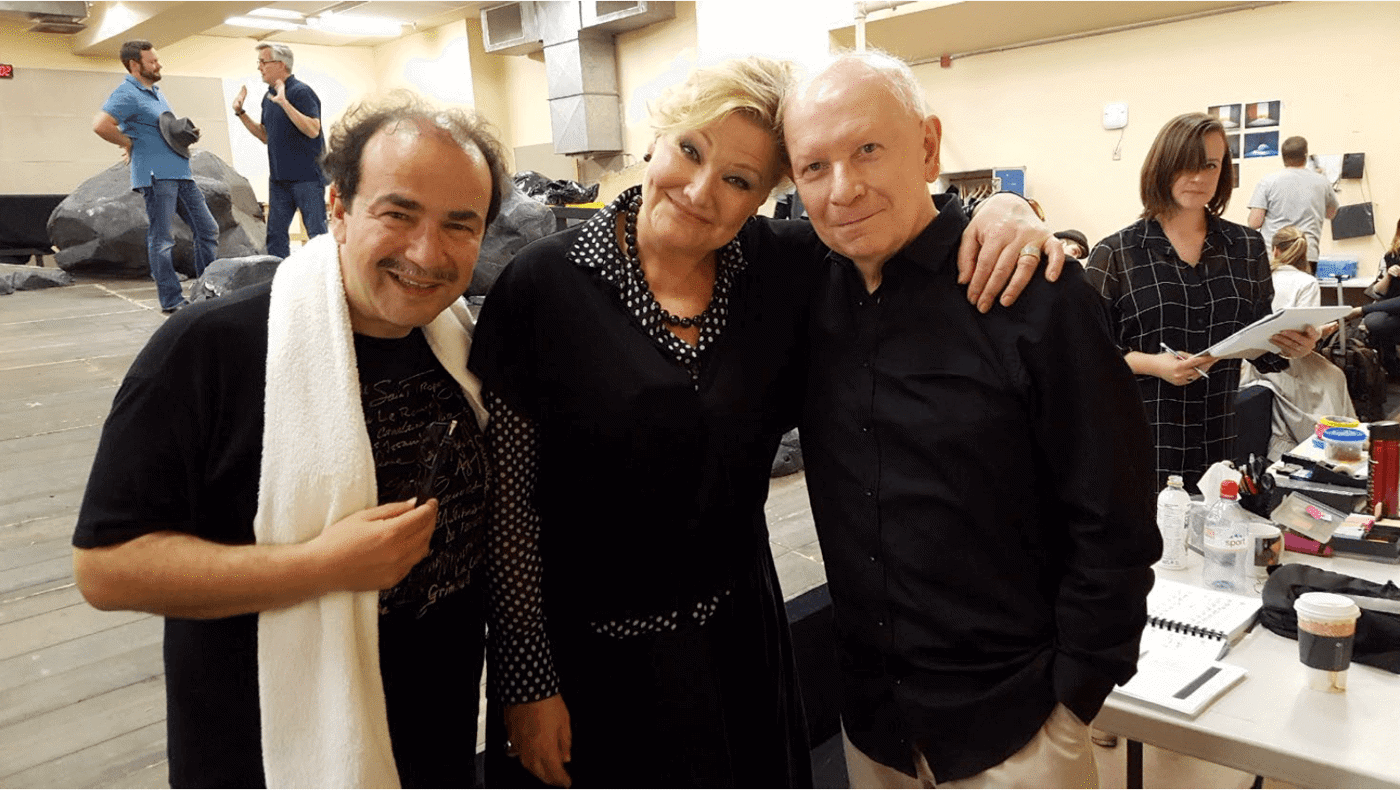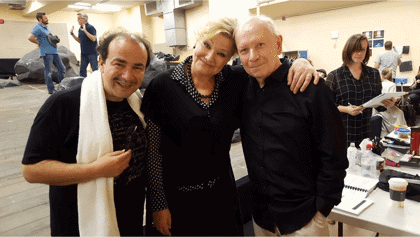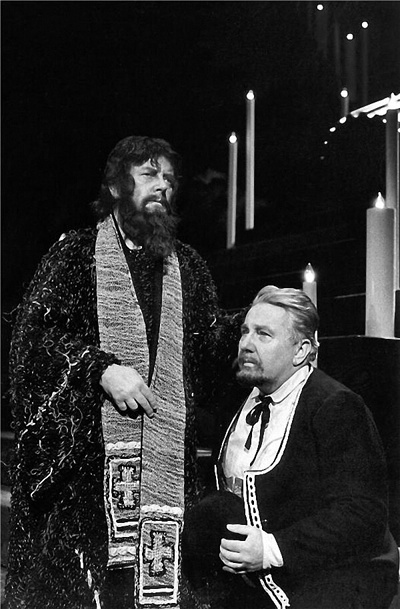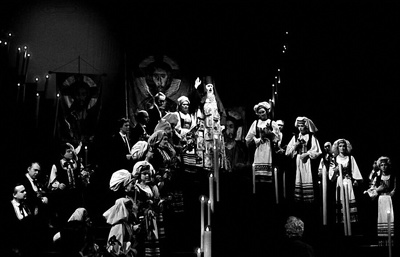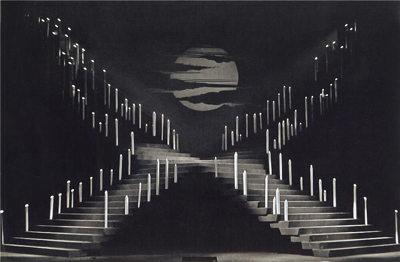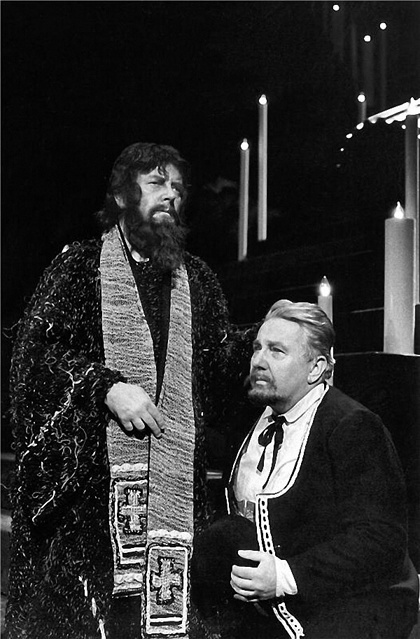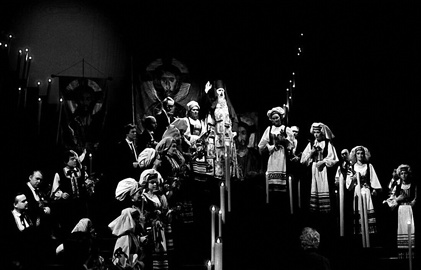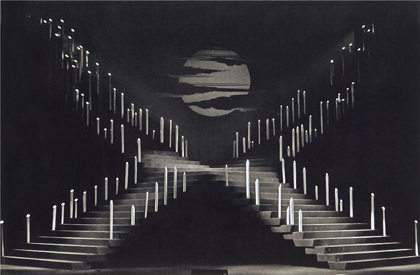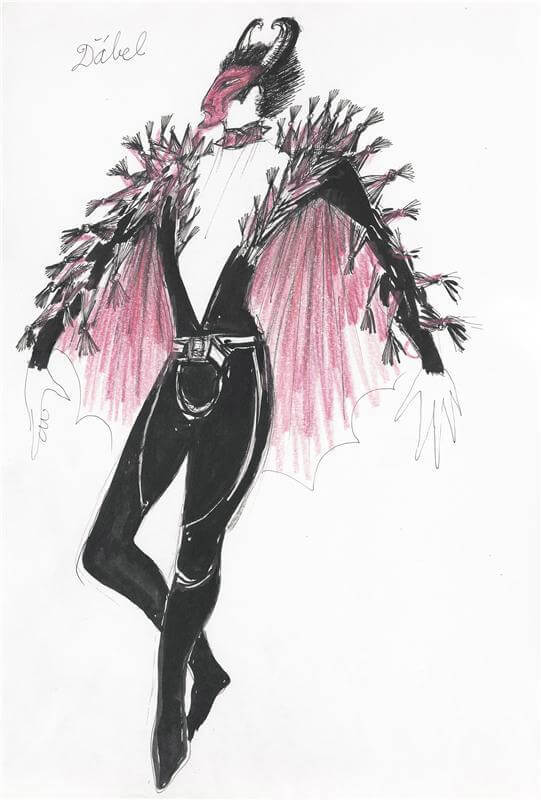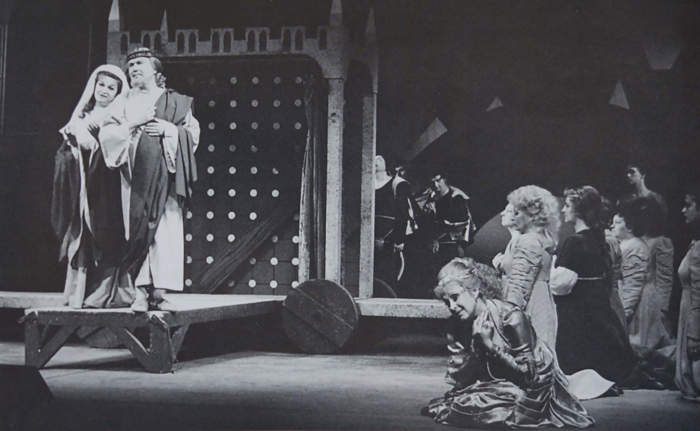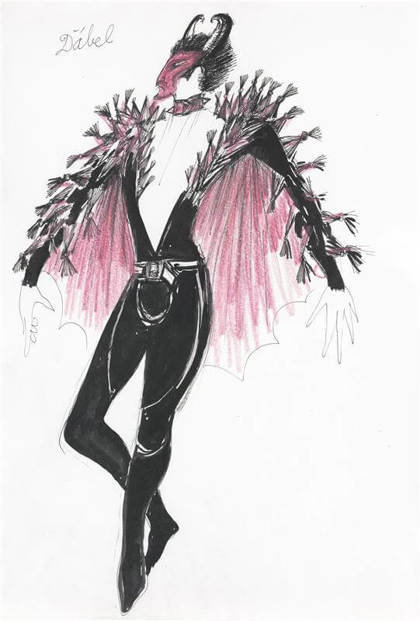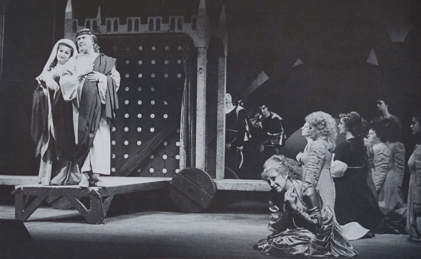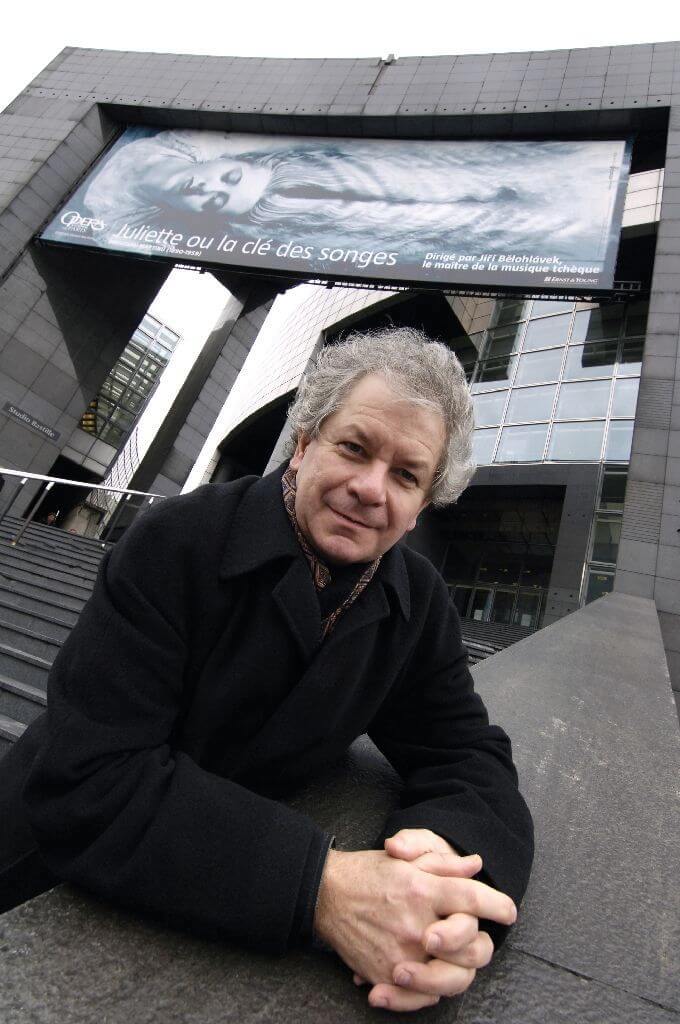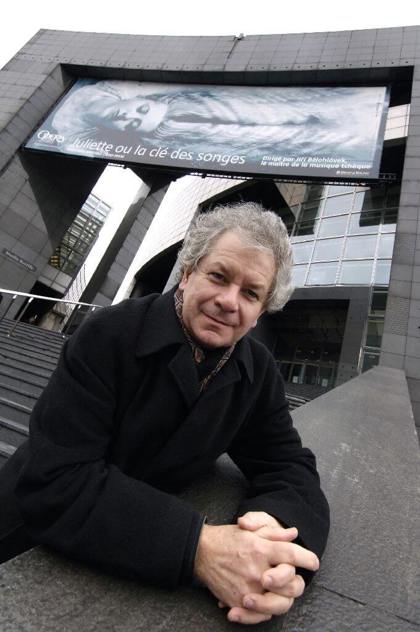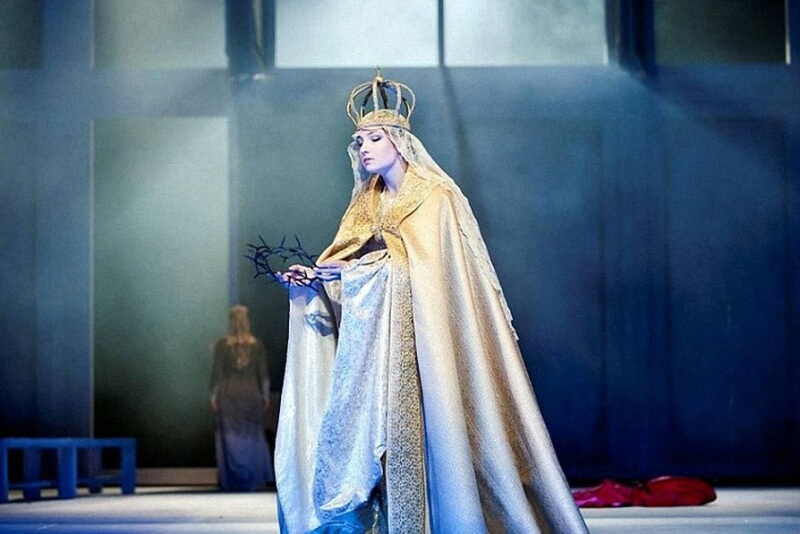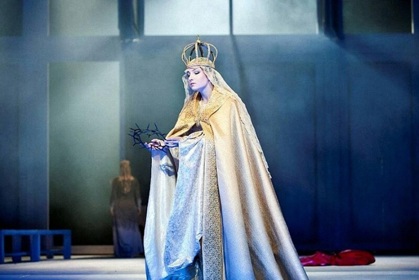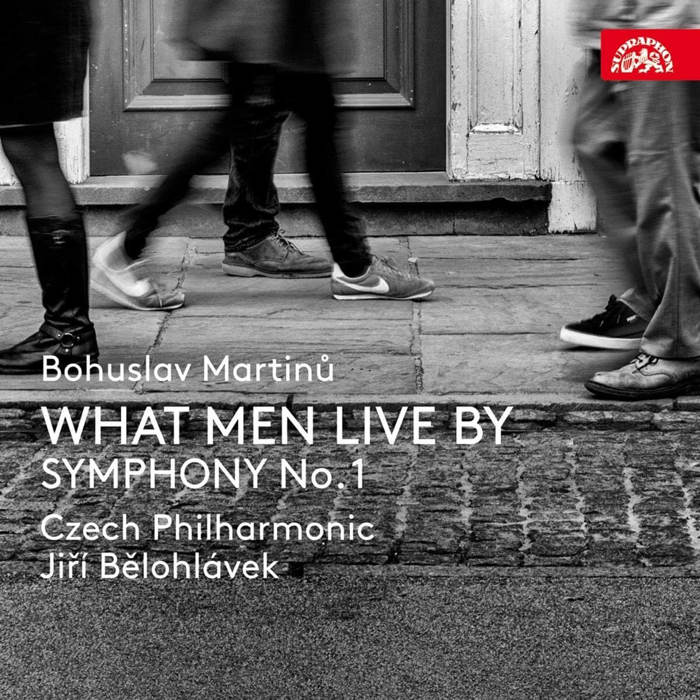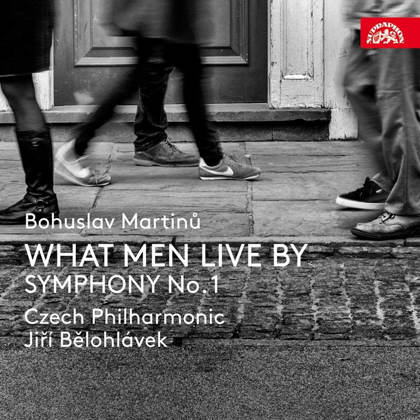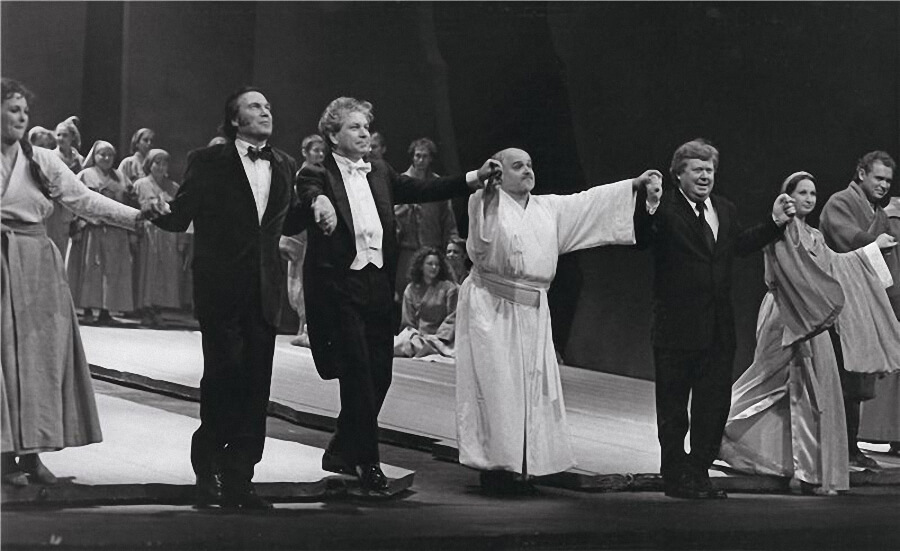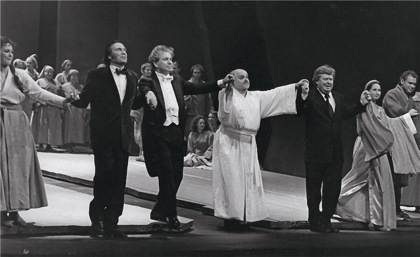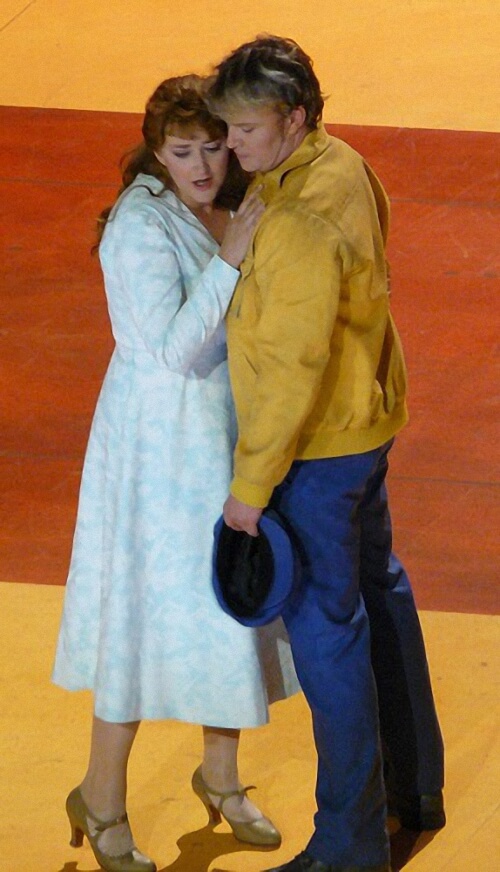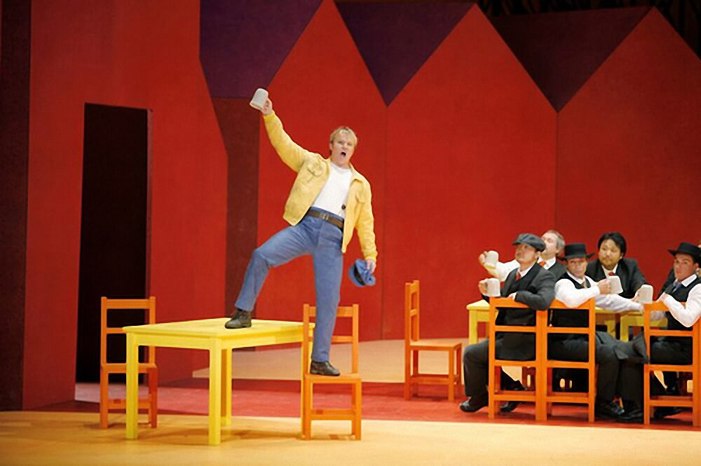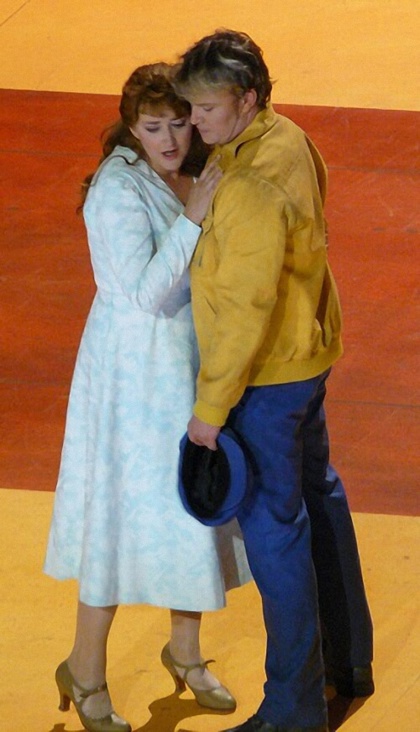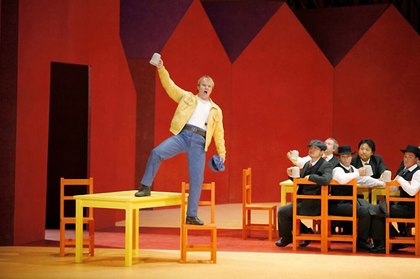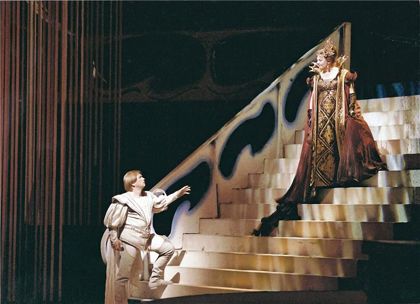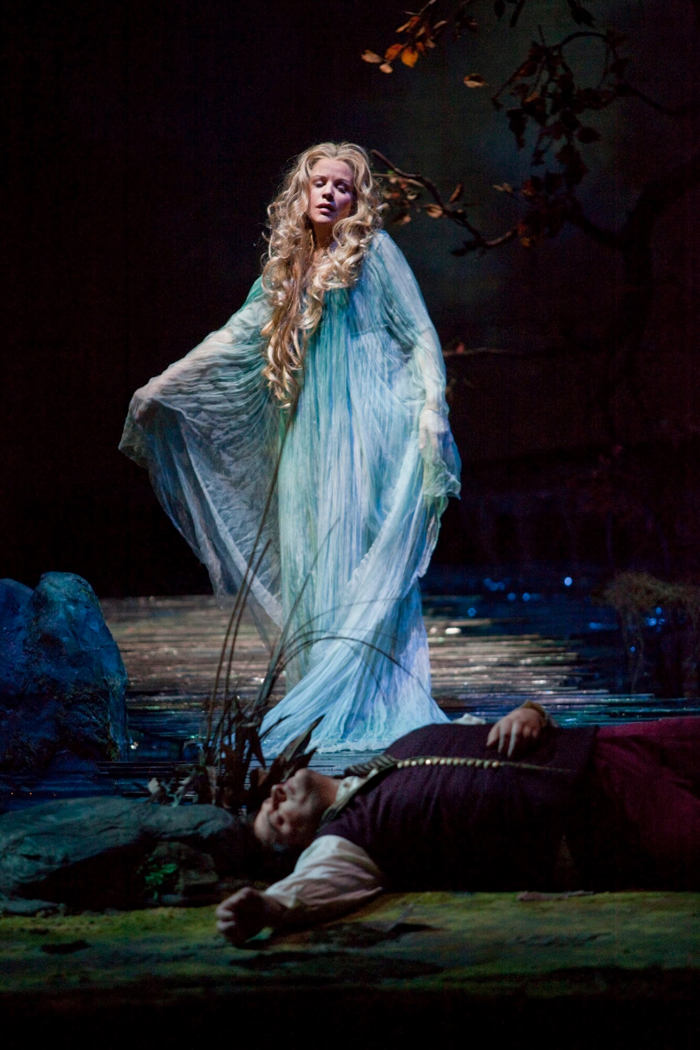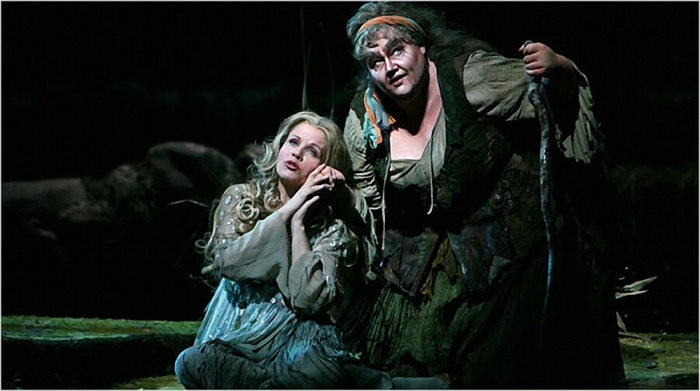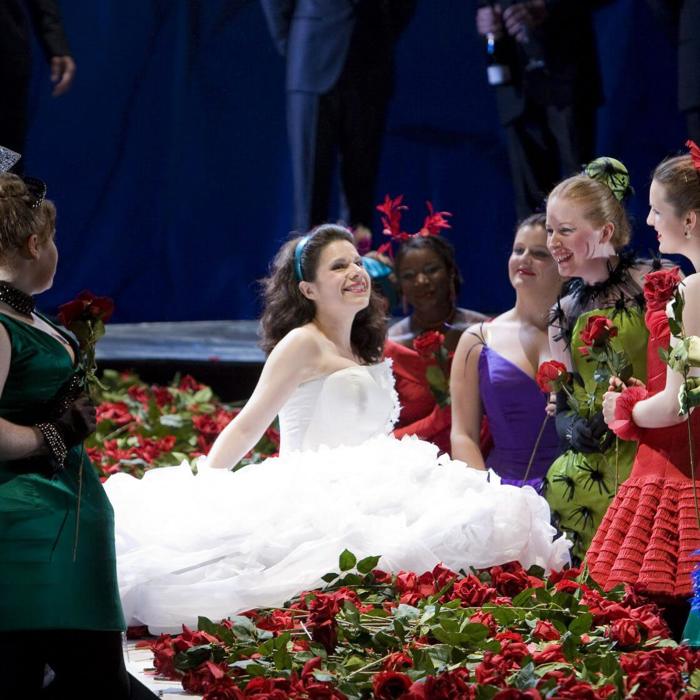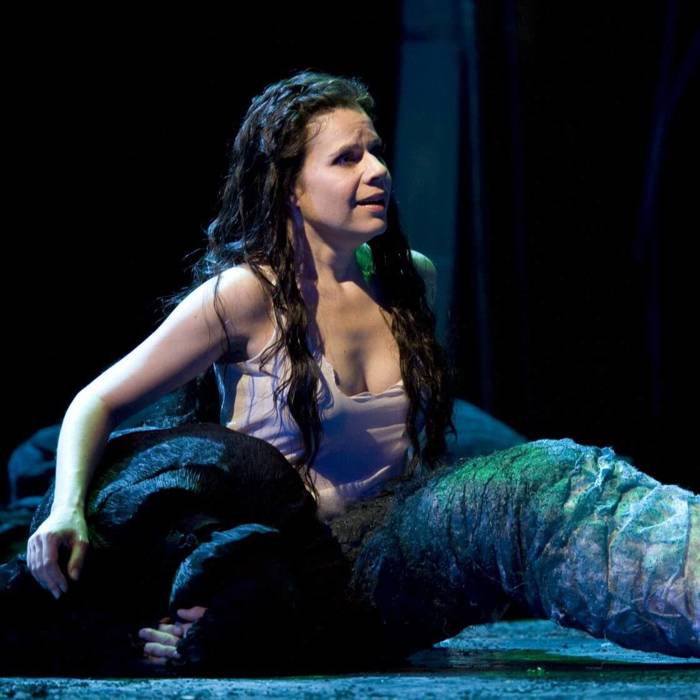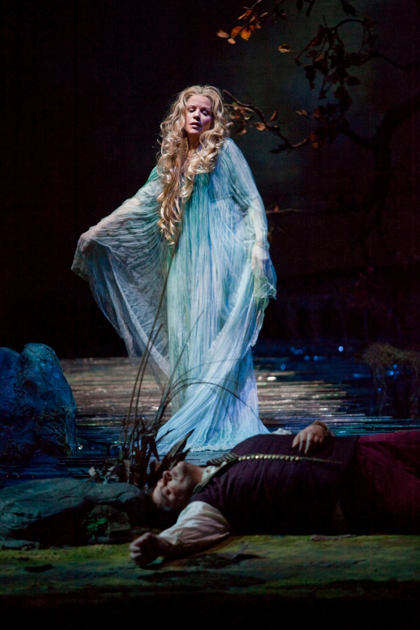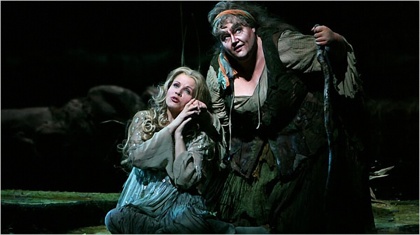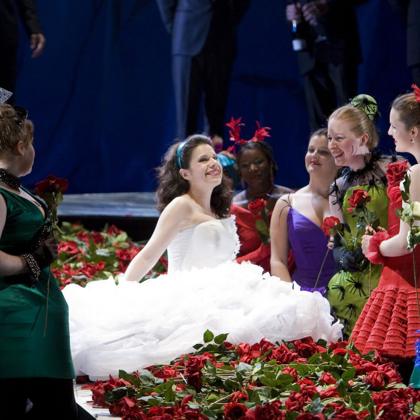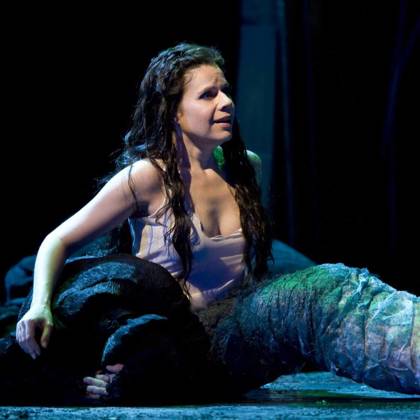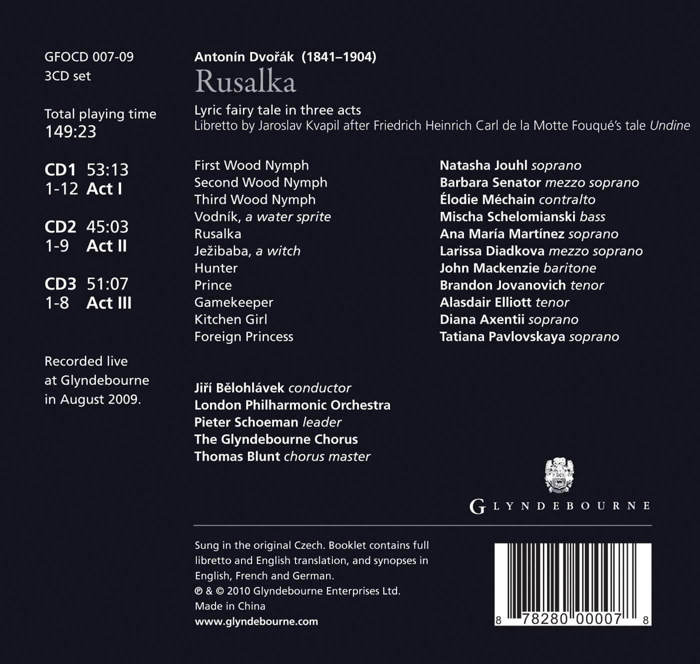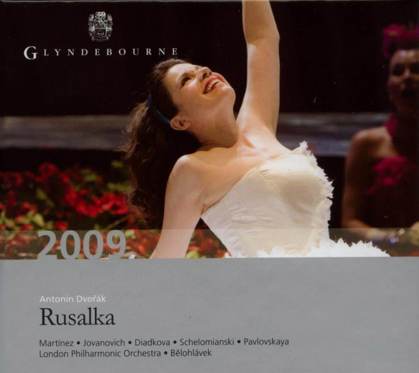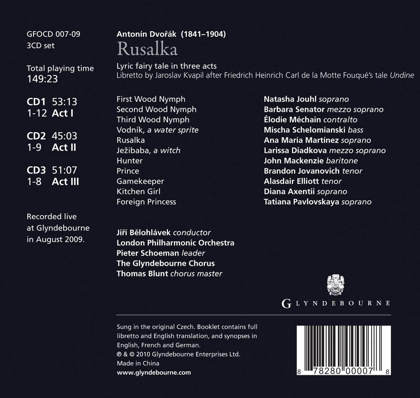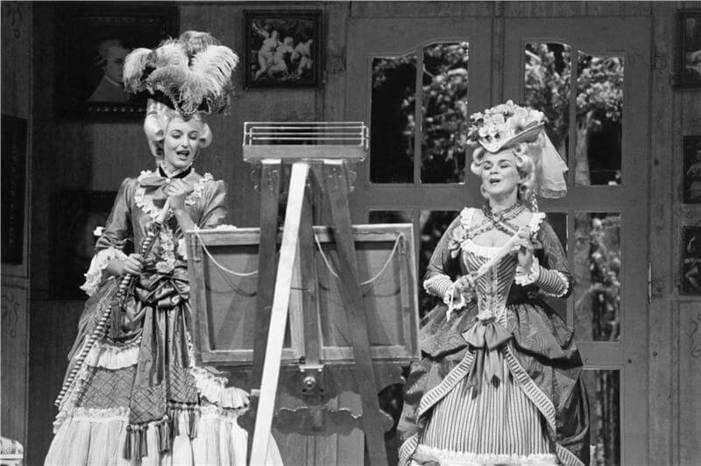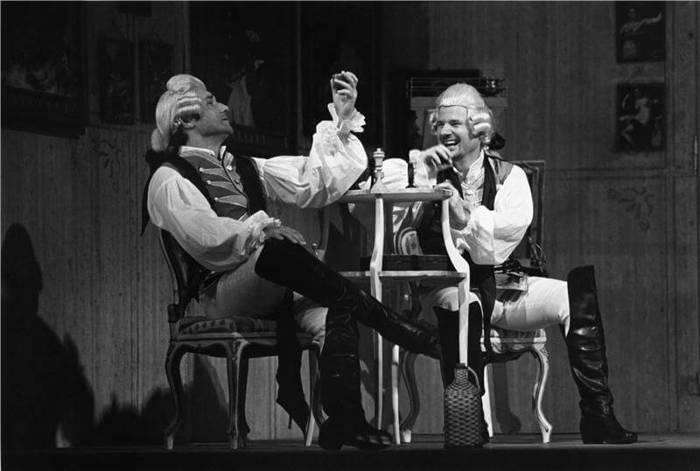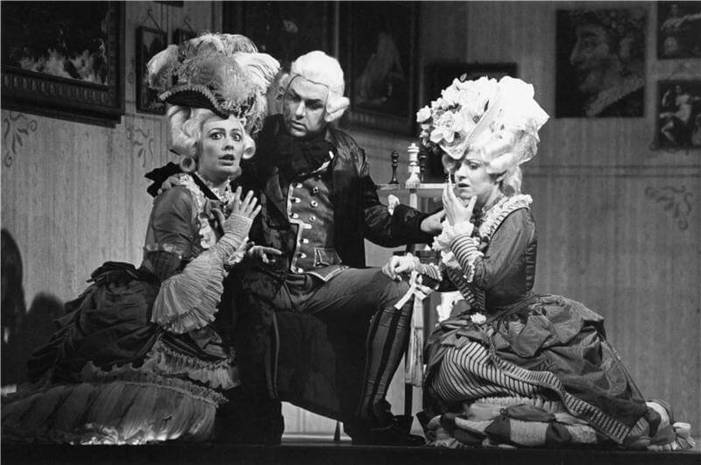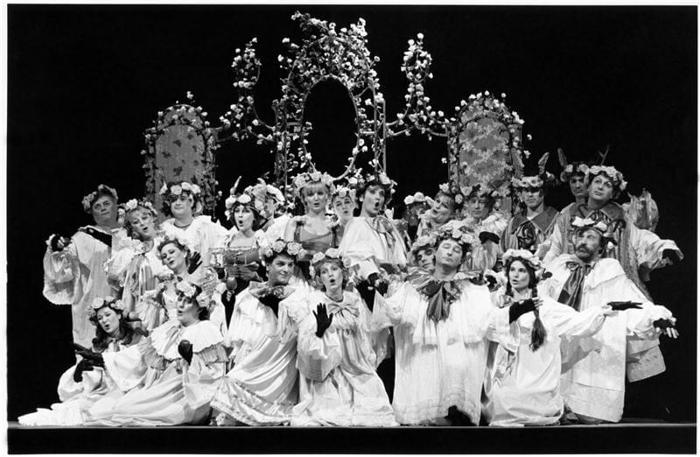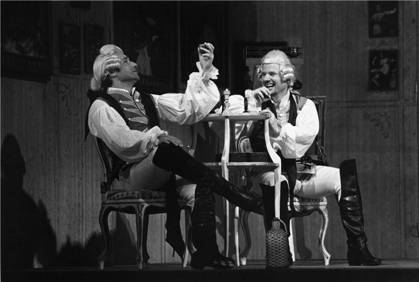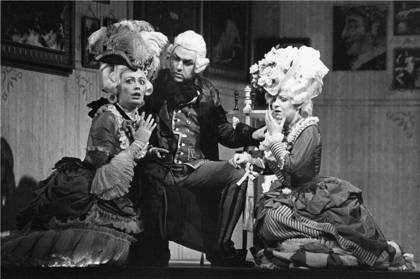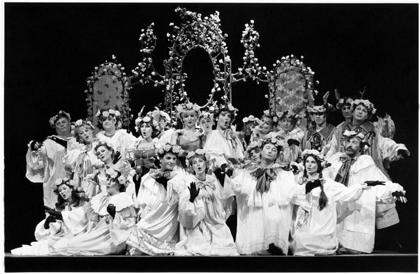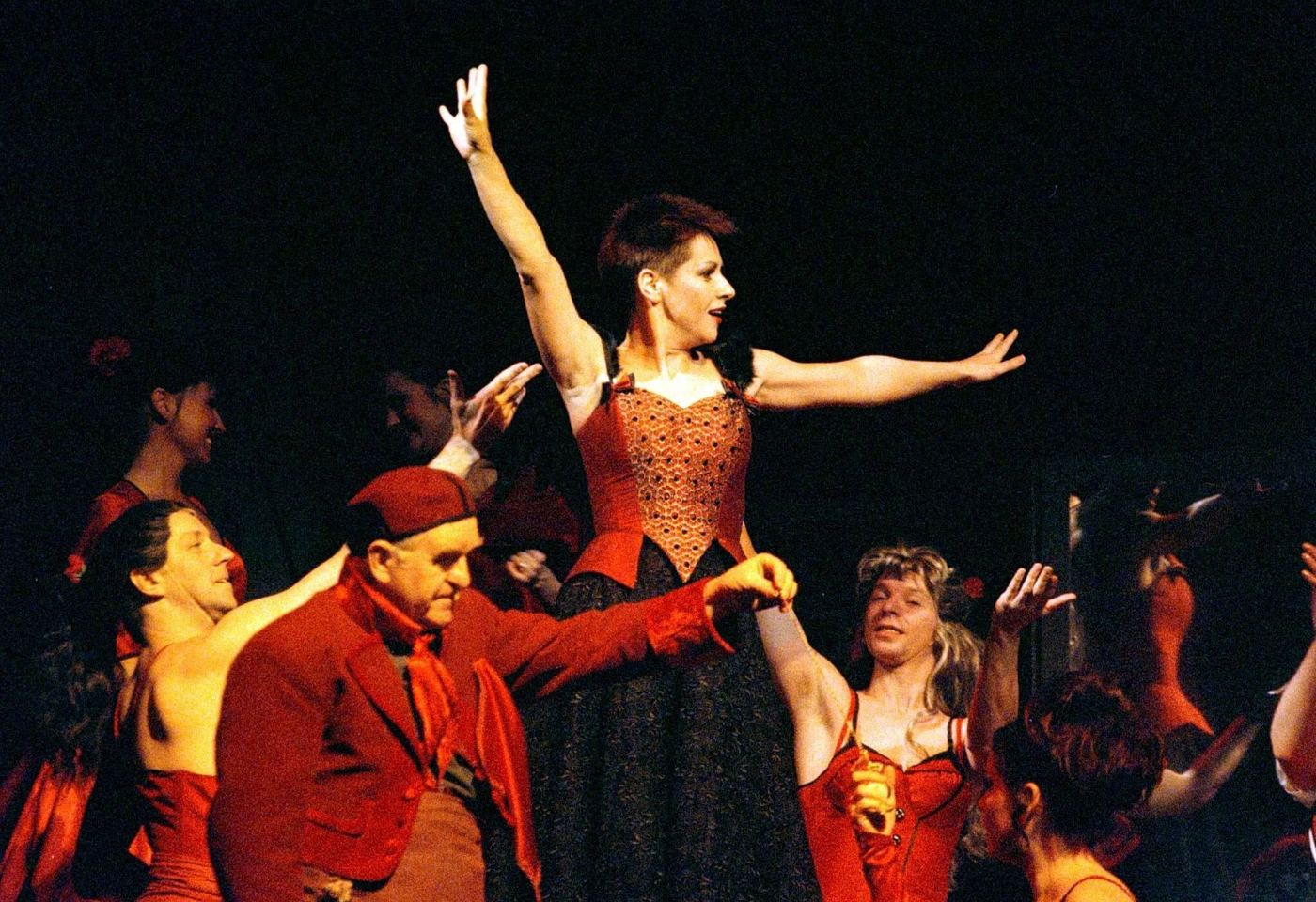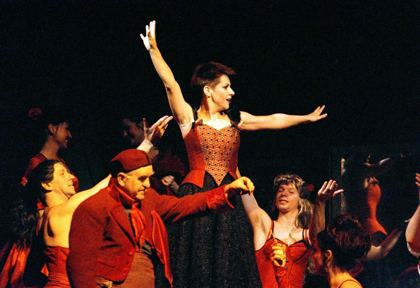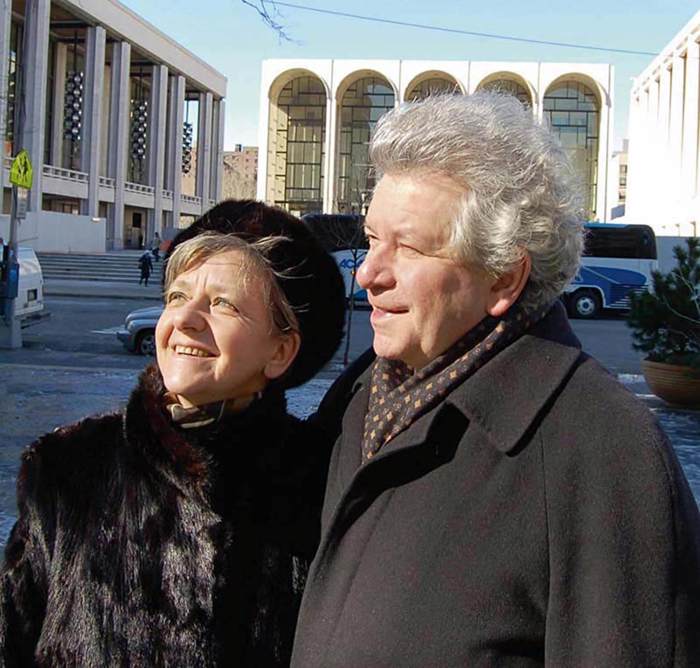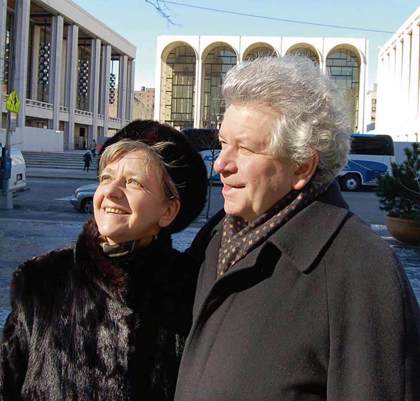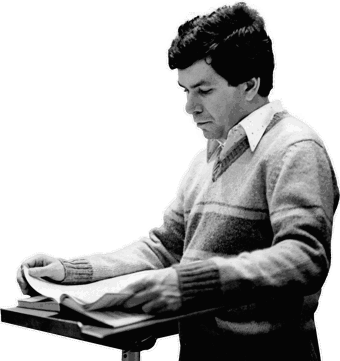“I feel so close to the opera because I believe that working with the human voice is actually the most beautiful thing there is. The human voice is the most formable, but at the same time the most fragile and vulnerable musical instrument.”
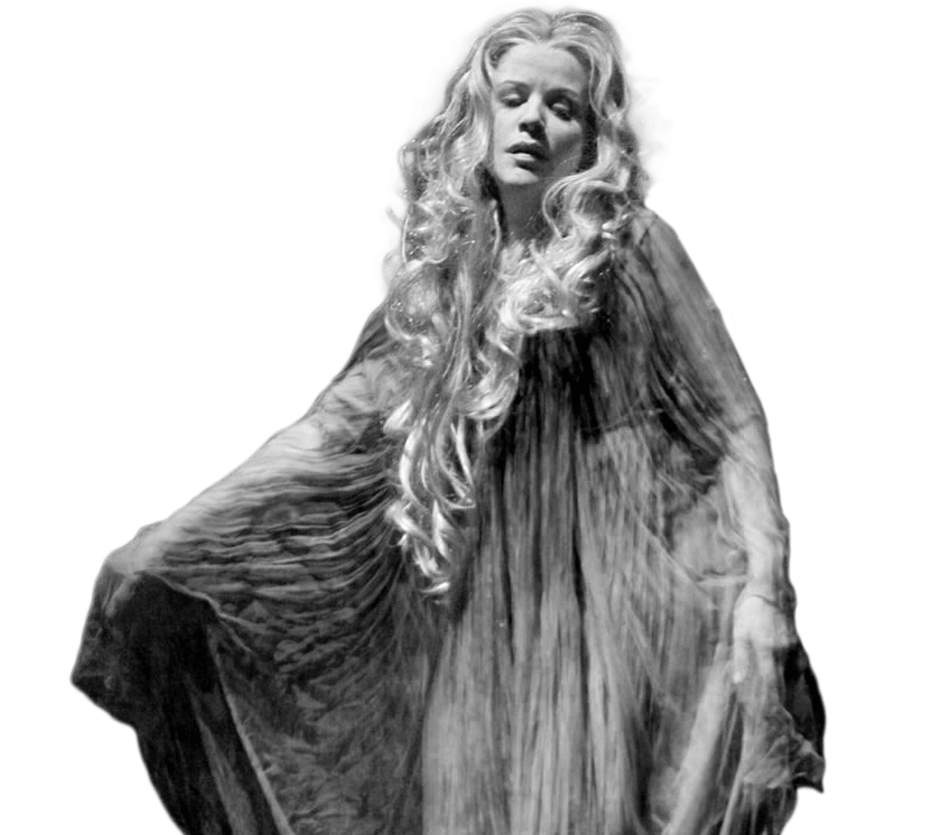
Jiří Bělohlávek got acquainted with opera already in his childhood, taking part in the National Theatre productions as a member of the Prague Philharmonic Children’s Choir. He appeared for example in Jacobin, Cunning Little Vixen and Carmen. His father, an excellent amateur pianist and accompanist for a Prague amateur opera company, also influenced him greatly. He took his son to rehearsals, and he would play through various works from piano sheet music of operatic scores at home, singing all the roles and radiating contagious enthusiasm. [ 2 ]
Bělohlávek’s first experience with conducting opera was gained during his studies at the Academy of Performing Arts in Prague, where he focused on Mozart’s operas. With students of the singing department and the orchestra of the Smetana Theatre (now State Opera Prague), he performed The Marriage of Figaro at the Disk Theatre. He already knew how to conduct the orchestra “with a feeling for the specific nature of opera performances where, instead of the need to build up the complex symphonic whole, it is necessary to have an understanding for actors’ dramatic expression and to share the responsibility for individual performances.” [ 3 ]
In the late 1960s and early 1970s he worked at the Vinohrady Theatre as a consultant, conductor of the drama orchestra and occasionally as a composer of music for some plays. He got a chance to take part in an important performance on a prestigious stage in 1977, when Václav Neumann invited him as a collaborator to the Berlin Comic Opera. They staged and performed Bedřich Smetana’s Secret. In 1978, he independently prepared Stravinsky’s The Rake’s Progress for the same opera house.
It was our Jiří Bělohlávek who was asked to lead and perform this demanding work. Not only did he inspire the orchestra, but also led and coordinated the singers with supreme expertise. In collaboration with the director Friedo Solter, they created a production with a logical tempo and structure, with a well-timed order of gradations and climaxes, enabling thus the dramatic effect to happen.
In Bělohlávek’s whole opera career, productions of Czech operas – by Leoš Janáček, Bohuslav Martinů, Antonín Dvořák and Bedřich Smetana – are by far the most numerous. This is understandable - stages at home are more likely to perform Czech composers, while foreign opera houses prefer to invite an experienced and renowned conductor of Czech nationality to conduct a Czech work. Bělohlávek explained this clearly in an interview: “It is the same as with native speakers. When native speakers speak, you recognize immediately their discourse as natural. And it is distinctly different from a speaker who learned the language as a second language – with some admirable exceptions, of course. That’s why for Czech people, Czech music is actually the closest. It is the expression of one’s own language, one’s own feeling and understanding of music.” [ 5 ]
Bělohlávek conducted more than forty-five opera productions, and in addition he recorded the music for Otmar Mácha’s TV opera The Metamorphoses of Prometheus (1981) with the Prague Symphony Orchestra. About one quarter of the operas he conducted were presented in the form of a concert performance. Although he understood the opera as Gesamtkunstwerk, where “the music needs to be complemented by the staging and acting so that it all makes sense“ [ 6 ], concert performances enabled him to present the audience with lesser-known or forgotten works of Czech composers, e.g. Janáček’s Excursions of Mr. Brouček or Smetana’s Dalibor, thanks to a lower cost of such productions.
I’d brought the practice of concert performances of operas from London where I’d dealt with operas regularly. It was a way in which I responded to directors’ crazy extravaganza that we sometimes encounter on the stage. However, I am aware of the fact that a concert performance of an opera is only a fragment somehow. The opera is a work combining music and drama, and the visual dimension belongs to it. To cut it away is to create a mesalliance. Nevertheless, the music in the works we choose is so beautiful and precious as it is that I find it meaningful to present it anyway – and it has the expected effect.
Bělohlávek’s lifelong affection for opera and vocal compositions in general is illustrated not only by the impressive number of performances he gave, but also by his other musical activities and recordings. In 1984, he recorded famous arias of Czech and foreign operas performed by the soprano Jana Smítková, the baritone Klement Słowioczek and the Prague Symphony Orchestra FOK for the Panton label (1984). The recording features arias from Smetana’s The Secret, Janáček’s Káťa Kabanová, Bizet’s Carmen and Weber’s Der Freischütz.
In 1994, Bělohlávek with PKF – Prague Philharmonia and two foremost Czech singers released two CDs with a selection of famous Mozart arias - “Vado, Ma Dove? Arias For Soprano“ with Eva Urbanová and “W. A. Mozart – Che Bella. Mozart Opera Arias“ with Dagmar Pecková. He also collaborated with both singers on several concerts in the 1990s and at the beginning of the new millennium.
Bělohlávek got involved in activities organized by Ivana Leidlová aimed at bringing the name of the opera singer Jarmila Novotná back into public awareness in the Czech Republic. Bělohlávek knew the singer and remembered her as “a generous artist who had helped him greatly in the 1980s when he’d first come to the USA”. [ 8 ] He helped willingly, both through his art and contacts. He became a member of the artistic board of the Jarmila Novotná Festival and conducted an open-air concert at Chateau Liteň entitled Homage to Jarmila Novotná in August 2014 where soloists of foremost opera houses Martina Janková, Dagmar Pecková, Adam Plachetka and Štefan Margita sang famous arias and duets, accompanied by the PKF – Prague Philharmonia.
Maestro Bělohlávek has not only mastered the score, but he also knows all the roles by heart. He always sings together with the singers during a performance. In this way they have two prompters – one is the conductor and the other the actual prompter. One cannot hear the conductor singing in the audience as he is turned towards the stage. What a shame!
Opery Leoše Janáčka
Considering the number of performed opera titles and the number of different productions of one single opera, Leoš Janáček is by far the champion in Bělohlávek’s career. Janáček’s operas have become well-known on stages around the world and productions of Jenůfa, Káťa Kabanová, The Cunning Little Vixen or The Makropulos Affair are now common. Other of his works – Destiny, From the House of the Dead or The Excursions of Mr. Brouček - are becoming more and more popular as well.
|
1985 |
Jenůfa |
Opera Seattle, USA |
|
|
1997 |
Jenůfa |
National Theatre, Prague, Czech Republic |
|
|
2000 |
Jenůfa |
Glyndebourne, UK |
|
|
2002 |
Osud |
National Theatre, Prague, Czech Republic |
|
|
2003 |
Káťa Kabanová |
Grand Théâtre de Genève, Switzerland |
|
|
2003 |
Káťa Kabanová |
Finnish National Opera, Helsinki, Finland |
|
|
2004 |
Z mrtvého domu |
Grand Théâtre de Genève, Switzerland |
|
|
2004 |
Káťa Kabanová |
Metropolitan Opera, New York, USA |
|
|
2007 |
Jenůfa |
Metropolitan Opera, New York, USA |
|
|
2007 |
Excursions of Mr. Brouček |
BBC Symphony Orchestra, Londýn, Velká Británie |
Concert performance |
|
2007 |
Jenůfa |
National Opera, Washington, USA |
|
|
2008 |
Destiny |
BBC Symphony Orchestra, BBC Proms, London, UK |
Concert performance |
|
2008 |
Káťa Kabanová |
Teatro Real, Madrid, Spain |
|
|
2010 |
Makropulos Affair |
Opera San Francisco, USA |
|
|
2012 |
Makropulos Affair |
Metropolitan Opera, New York, USA |
|
|
2016 |
Jenůfa |
Czech Philharmonic, Prague, Czech Republic Czech Philharmonic, London, UK |
Concert performance |
|
2016 |
Jenůfa |
Opera San Francisco, USA |
|
|
2016 |
Makropulos Affair |
BBC Symphony Orchestra, BBC Proms, London, UK |
Concert performance |
Bělohlávek began his overseas opera career by a production of Jenůfa in Seattle, USA, in the spring of 1985: “To protect Janacek’s interests in the pit, Jenkins engaged Jiri Belohlavek, a young conductor from Prague. It turned out to be a wise choice. Belohlavek made his excellent orchestra, composed of members of the Seattle Symphony, brood and soar and shimmer with dramatic sensitivity. He also gave his singers ardent support, even mouthing the strange English text in sympathy.” [ 10 ] It took him twelve years to perform this opera again, this time at the National Theatre in Prague in 1997, together with the director Josef Průdek.
It was the first of several projects that were carried out in the 1990s as part of Bělohlávek‘s supposed future position as head of the National Theatre Opera. In 1995, Bělohlávek was appointed as the artistic director of the opera of the National Theatre in Prague starting on 1 January 1998 until July 2002. However, since the Ministry of Culture had not fulfilled the promise of increasing the opera budget, Bělohlávek resigned from the post in 1997.
A great international success was the staging of Jenůfa for the Glyndebourne Festival in 2000. The production was based on the previous staging done by the director Nikolaus Lehnhoff in 1989, starring this time Amanda Roocroft in the role of Jenůfa, Anja Silja as Kostelnička, Susan Gorton as Buryjovka, Štefan Margita as Laca Klemeň and Par Lindskog as Števa. This series of twelve festival performances were an important impetus for Bělohlávek’s further engagements with prestigious opera houses around the world.
The first night will most probably count as one of the greatest music theatre experiences in the entire history of Glyndebourne and certainly as the most accomplished evening in the new house. (…) However, it is difficult to imagine that Janáček's first opera would have made such an impact without the Czech conductor Jiří Bělohlávek, a frequent visitor to this country and currently Principal Guest Conductor of the BBC Symphony as well as of the Prague National Theatre. He was conducting at Glyndebourne for the first time. His insight into Janáček's sublime musical language and speech melodies created dimensions of clarity, transparency and tension, which never overshadowed the stage, but forced orchestra and singers to follow his intentions and, therefore, gave the music all the space to breathe and to develop. Under his baton the London Philharmonic played with magical intensity. Contrary to many excellent Janáček interpreters, Bělohlávek avoided heaviness, preferring a subtle sound structure instead, which made everybody listen and asked for utmost concentration.
Another impressive production, closely followed by the media, appeared two years later – Janáček’s Destiny under the stage direction of Robert Wilson (National Theatre in Prague, 2002). Wilson managed to put this „unstageable“ work on stage with such an impressive result, using the means of visual arts, movement and choreography, so one of the reviewers could write in all earnest that “almost a century after its creation, the Destiny received its first successful theatre adaptation.” [ 12 ]
Bělohlávek continued to praise Wilson’s convincing direction even many years later: “I’ve seen several productions of the opera and none of them was quite satisfactory. The production we created with Robert Wilson in Prague, albeit unusual and somewhat exclusive, managed to capture the atmosphere of the score the most successfully. I cherish the memories of it.”[ 13 ]
The score of the Destiny is extremely demanding for the conductor with many challenges lurking in it. (…) Bělohlávek managed to overcome all the difficulties present in the score (difficult harmonics, peculiar divisi in strings, exposed brass etc.) fantastically. The orchestra’s play built suspense, was dramatic, and as colourful and in tune as possible.
The close of 2003 was dedicated to Káťa Kabanová. Bělohlávek conducted the opera at the Grand Théâtre de Genève in November, launching a series of Janáček productions that he conducted at this opera house over the following years. Dagmar Pecková appeared in the role of Varvara.
At the turn of 2003, Bělohlávek conducted the opera at the Finnish National Opera in Helsinki, where Káťa was sung by the sought-after Janáček performer, Karita Mattila, and where Bělohlávek invited his pupil Tomáš Hanus to be the assistant conductor.
The year 2004 was also devoted to Janáček. In November, Bělohlávek returned to Geneva to perform From the House of the Dead, featuring among others the Slovak bass Peter Mikuláš in the role of Gorjančikov and Štefan Margita as Filka Morozov.
…la performance de l'orchestre mérite également les plus grands éloges. Après un premier acte légèrement flottant et manquant de tension, Jiří Bělohlávek et l'OSR montrent une parfaite maîtrise d'une partition très exigeante au plan instrumental, dont l'orchestration iconoclaste est ici magnifiquement rendue. A ce titre, les oppositions de registres extrêmes particulièrement délicates qui émaillent la partition rendent compte à la fois de la noirceur du propos comme de la nature solaire du compositeur. Et à l'évidence, Bělohlávek, en bon tchèque, est entièrement habité par l'oeuvre.
...the orchestra's performance also deserves the highest praise. After the first act that floated smoothly and lacked tension slightly, Jiří Bělohlávek and the OSR mastered the very demanding score perfectly at the instrumental level and rendered its iconoclastic orchestration magnificently. In this respect, the particularly delicate oppositions of extreme registers present in the score reflect both the darkness of the subject of the opera and the sunny nature of the composer. And clearly, Bělohlávek, as a proper Czech, is completely absorbed by the work.
December brought Bělohlávek’s debut in arguably the most famous opera house in the world - the Metropolitan Opera in New York - with Janáček’s Káťa Kabanová. Varvara was sung by Magdalena Kožená, Káťa by the Finnish soprano Karita Mattila, Kabanicha by Judith Forst, Boris by Jorma Silvasti, Tichon by Chris Merritt, Kudrjaš by Raymond Very, and Dika by Vladimir Ognovenko. Jonathan Miller was the director and Robert Israel was the author of the stage design and costumes. It was premiered on 17 December to be followed by four more performances, one of which – on 25 December – was broadcast by radio stations all over the world including the Czech Radio. An internal recording of this night was made by the Metropolitan Opera.
The noted Czech conductor Jiří Bělohlávek, in his Met debut, won cheers for leading an authoritative, richly colored, supple and haunting account of Janáček's multilayered and inexorable score.
In 2007, Bělohlávek returned to the Metropolitan Opera to give six performances of Jenůfa in January and February. The title role was performed again by Karita Mattila, the soprano Anja Silja was Kostelnička, and the tenors Kim Begley and Jorma Silvasti were Laca and Števa respectively.
Janáček’s unconventional score sets the vocal lines with a singsong naturalism, while in the orchestra cyclic motifs and melodic fragments swirl in a wash of thickly chromatic harmony, prodded along by obsessive rhythmic figurations. The Czech conductor Jiří Bělohlávek was especially sensitive to the music’s lyrical outpourings and folkloric touches. With his approach, the rich, wistful and glowing music in the final scene seemed especially humane.
In May of the same year, Bělohlávek conducted Jenůfa again, at the Washington National Opera. Before this happened however, he together with the BBC Symphony Orchestra prepared a concert performance of what is probably Janáček’s most original opera, The Excursions of Mr. Brouček, which took place on 25 February in London. The solo parts were sung exclusively by Czech and Slovak singers. Jiří Vacík appeared as Mr. Brouček and other roles (often more than one) were sung by Peter Straka, Maria Kobielska (Haan), Lenka Šmídová, Roman Janál and Aleš Briscein. A recording of this concert was released in January 2008 on the Deutsche Grammophon label and received positive acclaim, as did the concert itself. Moreover, it was awarded by the Gramophone magazine and received the MIDEM Classical Award 2009 in its category at the Cannes International Music Fair.
This may not be the last recorded word on Brouček, but right now it sounds like a major improvement on what we've had before: the strength and depth of the cast, and most of all the sound quality, and Bělohlávek's feel for the tenderness, humour and romance of one of Janáček's least appreciated, yet most original dramas.
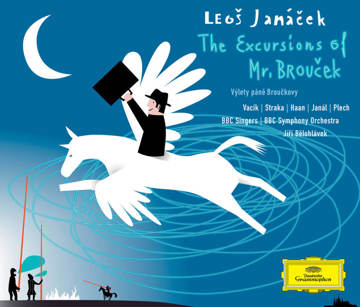
In August 2008, Bělohlávek and the BBC Symphony Orchestra gave a concert performance of Janáček’s Destiny at the BBC Proms in the Royal Albert Hall. Štefan Margita as Živný and Amanda Roocroft as Míla starred among the international cast. The production of Káťa Kabanová, imaginatively directed by Robert Carsen, was performed on ten subsequent evenings in Teatro Real in Madrid giving the audience the chance to witness the tragic fate of a young woman driven to suicide by hypocritical society. Káťa was brilliantly portrayed by Karita Mattila, Kabanicha by the Israeli mezzo-soprano Dalia Schaechter, Boris by the Slovak tenor Miroslav Dvorský and Dikoj by Oleg Bryjak. A live recording of the performance was released in 2010 on DVD and Blue-ray on the FRA Musica label.
The second important element in this representation was the Jiří Bělohlávek’s musical direction. He is one of the most esteemed Czech conductors just now, if not the best of all of them. His reading was magnificent. Nothing was lacking: everything written in the music was there in fact, tension, strength, lyricism, inspiration. The Teatro Real Orchestra felt like a new one, giving one of their best performances in years. How orchestras can change with an expert conductor!
From the very first tones to the end, this lyrical drama is magically appealing – and it is in this particular case hard to decide whether it is more due to the music, due to Janáček’s genius and the conductor’s intense grasp of the score, or rather due to the visual dimension - the wonderfully elaborate simple visual devices, the harmony between the singers’ expressive acting and the whole stage, the balance between music and theatre.
Bělohlávek staged The Makropulos Affair in 2010 for the first time, at Opera San Fransisco, where this work of Janáček had had its American premiere in 1966. The staging was co-produced by the Finnish National Opera and it starred Karita Mattila as Emilia Marty and Miro Dvorský as Albert Gregor. Olivier Tambosi was the director. This was another instance of collaboration between Bělohlávek and Karita Mattila and it was she who requested this conductor for the production. Bělohlávek and Mattila followed up on their Janáček collaboration two years later (2012) when The Makropulos Affair was staged at the MET, directed by Elijah Moshinsky. Bělohlávek and Mattila’s immediate professional understanding transformed soon into genuine friendship and gave rise to many successful later projects together. In the media, they would show deep respect and admiration for one another. When speaking for The Wall Street Journal about The Makropulos Affair at the Metropolitan Opera, Mattila said:
“‘This is a gift from heaven,’ Ms. Mattila said with characteristic overstatement, referring to Mr. Belohlávek's presence in the pit. ‘He understands this music; it's in his native language. Uta Hagen writes that the director is the actor's main support. We singers are so lucky that in the best situation we have two support vessels: the conductor and the director, especially if they work well together. And that's also called heaven—having two wonderful guides.’” [ 21 ]
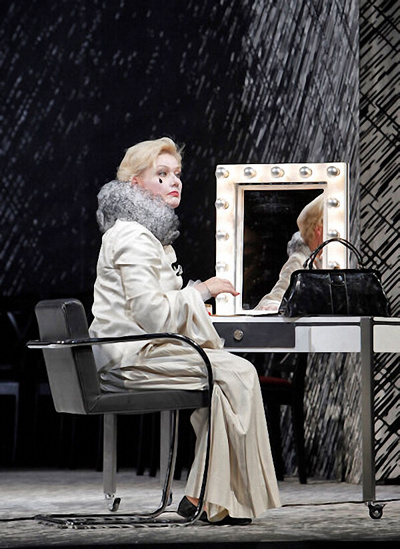
“In the pit, debuting Jiri Belohlavek affirmed his credentials as a masterly Janáček advocate. He tore into the turbulent prelude, favoured dramatic contrasts and reaped lustrous results from the composer’s network of brief, thematic material, which in this conductor’s hands blossomed into interludes of surpassing beauty. The opera’s rhythmic variety intermittently daunted the orchestra. The company has dedicated the production to the memory of Sir Charles Mackerras, a leading Janáček specialist here and internationally. On the glowing evidence here, Bělohlávek sounds very much like his predecessor. He should be invited back.”
Bělohlávek crowned his career of staging Janáček’s operas in April 2016 when together with the Czech Philharmonic he gave concert performances of Jenůfa – on 15 April at the Rudolfinum, and three days later, on 18 April, at the Royal Festival Hall, South Bank Centre, London.
One of the stars of this performance was again Karita Mattila, but this time not in the role of Jenůfa, but of Kostelnička, which she performed for the first time in her career. Jenůfa was performed by the soloist of the Slovak National Theatre Adriana Kohútková, and Jaroslav Březina and Aleš Briscein appeared in the roles of Števa and Laca. The concert was broadcast live from London by the BBC and received great acclaim from audiences and music critics, with five-star reviews in the UK’s leading newspapers The Daily Telegraph, The Independent and The Guardian.
Jiří Bělohlávek underlined the richness and beauty of Janáček’s operatic symphonism, elaborated the orchestral part into emotional and structural details that are not often heard in theatres, and in this way unintentionally justified the importance of such projects, otherwise uncommon in subscription concerts at home. (…) It was an unusual, but an adequate task for the Philharmonic: They gave Janáček’s colourful and electrifying music of deep psychological truth all the beauty of detail and complex sound. The opera was performed with a striking drama, an almost veristic urgency and the necessary catharsis of the conclusion. The Dvořák Hall at the Rudolfinum was packed and after the three-hour programme, the appreciation and enthusiasm would not stop.
The whole evening, though, was revelatory. Bělohlávek’s lyrical way with Janáček speaks volumes in a work in which love and pain are in constant proximity, and the Czech Philharmonic’s playing, richly detailed and superbly focused, was incomparable. The cast sang with a beauty of line that made other performances of the work seem overly declamatory. Adriana Kohútková is among the finest of Jenůfas, hauntingly vulnerable, the voice itself exquisite. Aleš Briscein made a well-nigh ideal Laca – passionate, grieving, powerfully self-aware. Jaroslav Březina’s arrogant, brutally sensual Steva was equally outstanding.
In June 2016, Bělohlávek conducted a number of performances of Jenůfa at Opera San Francisco, featuring the Swedish soprano Malin Byström as Jenůfa and Karita Mattila as Kostelnička. At the instigation of his friend Alexander Goldscheider, Bělohlávek kept a diary during the time when he was rehearsing and performing the opera. A transcription San Francisco Diary is available at KlasikaPlus.cz.
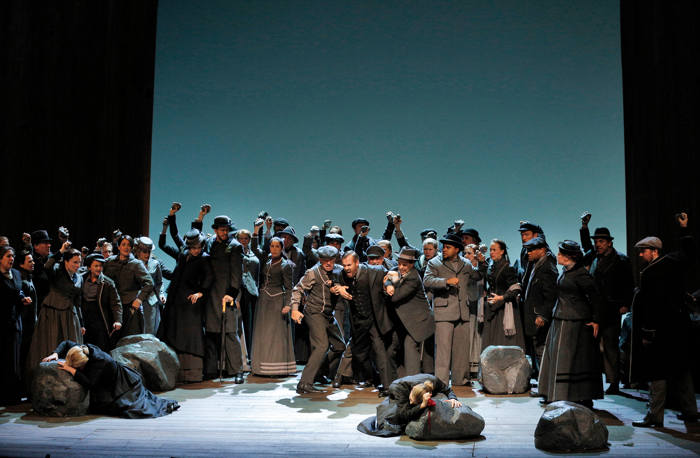
“Jiři Bĕlohlávek really is unrivalled in this repertoire and tonight led a reading that genuinely amplified the events on stage and succeeded in making this the overwhelming experience it was. The opening, with that insistent yet almost imperceptible xylophone motif really set the atmosphere and Bĕlohlávek brought out the tension in the score every time the motif reappeared. He also brought out the folk music aspects of the score and the marriage of lyricism and rhythmic impetus that abounds in the piece. The orchestra played well for him – the plangent oboe and the characterful clarinet deserve special mention. The brass also, full of personality, really stood out.”
The last of Janáček’s operas conducted by Bělohlávek was The Makropulos Affair. On 19 August 2016, he conducted it at the Royal Albert Hall as part of the BBC Proms in a concert performance with the BBC Symphony Orchestra, Karita Mattila and Czech singers. Considering the opera’s subject and message, it was a symbolic farewell indeed, as stated in a review by Anne Ozorio:
None of us will make age 337, but the message, as such, is not so much how long you live but how well you live. As Janáček wrote to Stösslová, after attending the Karel Čapek play on which the opera is based, ‘We are happy because we know that our life isn't long. So it's necessary to make use of every moment, to use it properly’.
Leading such a rich and fulfilling life as he did, Jiří Bělohlávek affirmed this message absolutely.
Operas by Bohuslav Martinů
|
1982 |
Miracles of Mary |
Prague Symphony Orchestra FOK, Prague, Czech Republic |
Concert performance |
|
1984 |
Greek Passion |
State Opera, Prague, Czech Republic |
|
|
1990 |
Miracles of Mary |
Janáček Opera Brno, Czech Republic |
|
|
1998 |
Greek Passion |
BBC Symphony Orchestra, London, UK |
Concert performance |
|
2006 |
Julietta |
Opera National, Paris, France |
|
|
2006 |
Greek Passion |
National Theatre, Prague, Czech Republic |
|
|
2009 |
Julietta |
BBC Symphony Orchestra, London, UK |
Concert performance |
|
2009 |
Miracles of Mary |
National Theatre, Prague, Czech Republic |
|
|
2012 |
Julietta |
Grand Théâtre de Genève, Switzerland |
|
|
2014 |
What Men Live By |
Czech Philharmonic, Prague, Czech Republic |
Concert performance |
Bělohlávek’s mission to propagate Bohuslav Martinů’s operas started in 1982 when he got an offer from Supraphon to record The Miracles of Mary with the Prague Symphony Orchestra FOK, where he was the chief conductor at the time: “It was a chance and a challenge for me that I accepted enthusiastically and took up with verve. Already then, when studying the composition for the first time, I literally fell in love with it for its peculiar beauty, unyielding nature and most importantly its stylistic diversity and the magnificent power of its musical language to create characters, that are all present in the score.” [ 43 ]
He therefore included the opera in the plan for the 1982/1983 season and prepared a concert performance of it with the orchestra in December 1982. The vocal cast included soloists Eva Děpoltová, Anna Bárová, Václav Zítek, Ivan Kusnjer and others. Choral parts were performed by the Czechoslovak Radio Choir and Bambini di Praga children’s choir. A recording of the work was then released on a Supraphon LP in 1985 (reissued on a CD in 1993). Working on The Miracles of Mary, however, was not Bělohlávek’s first experience with Martinů’s vocal works, he had previously recorded the oratorio Epic of Gilgamesh with the Prague Symphony Orchestra FOK, also for Supraphon (1976, reissued in 2007).
Bělohlávek’s debut in Czech opera houses was in 1984 when he conducted a State Opera production of Martinů’s Greek Passion. The director Václav Kašlík and the stage designer Zbyněk Kolář drew from their own expressive staging of the opera in 1967 when two intersecting diagonals dominated the stage, and they enriched it by more ideas and techniques that underlined the dramatical nature of the stage. The role of Katerina was performed by Naděžda Kniplová, that of Manolios by Miroslav Švejda, Fotis, the merciful priest, was sung by Jaroslav Souček, and the imperious priest Grigoris by Dalibor Jedlička.
Bělohlávek immediately hit the bull's-eye, understanding the work and the singers. Under his baton, this operatic epilogue of Bohuslav Martinů sounded superbly tender and profoundly emotional, at times almost chamber-like and at the same time full of unreleased dramatic suspense…
Bělohlávek’s first performance of an opera by Martinů outside of Prague was The Miracles of Mary at the Janáček Theatre in Brno. The production was directed by Alena Dopitová-Vaňáková, choreographed by Daniel Wiesner and the set and remarkable costumes were designed by Jan Vančura. It was well received, and reviewers also praised the fact that such a long-silenced opera which was almost unknown to the general public was presented.
Bělohlávek conducted another production of Martinů’s opera in the late 1990s. In January 1998, he took part in the week-long Martinů: Out of Exile festival, organized by the Guildhall School of Music & Drama and the BBC Symphony Orchestra and prepared a concert performance of The Greek Passion.
In 2006, Bělohlávek collaborated on two opera productions. In February, it was Juliette ou la Clé des songes at Opéra Bastille in Paris. For this production, the original French text written by Martinů, reconstructed by the French musicologist Harry Halbreich, was used for the first time. The premiere took place on Friday 3 February 2006 and it featured Elena Semenova (Juliette) and John Graham Hall (Michel) in the lead roles. Although the director’s and stage designer’s approach did not conform closely to Martinů's concept, which blurs the line between dream and reality deliberately, the musical component of the opera found a sensitive conductor in Bělohlávek.
Somptueusement dirigée par Jiří Bělohlávek, cette dernière s'affirme plus jamais comme une page majeure du XXe siècle, tant par le traitement des voix que pour l'invention qui préside à l'orchestration dont les couleurs, les contrastes et les agencements de timbres ne cessent de surprendre et de séduire, en restant toujours expressifs et en situation.
This production, conducted so magnificently by Jiří Bělohlávek, will more than any other convince everyone that the opera constitutes one of the major chapters of the twentieth century opera, due to the treatment of the voice lines as well as the invention that presides over the orchestration, whose colours, contrasts, and arrangements of various timbres never cease to surprise and seduce, while always remaining expressive and true to the story.
And yet another Martinů came in April, this time The Greek Passion at the National Theatre, Prague, reappearing on the stage after more than twenty years, and what is interesting - under the baton of the same conductor as in 1984.
Jiří Bělohlávek’s excellent musical rendering of the opera is based mainly on his experience with interpreting the works of Bohuslav Martinů, which he has built over years. Bělohlávek’s idea of the outcoming musical sound was made real to the last detail by the concrete, very good orchestral performance with an unusually rich sound of the instrumental sections, precise intonation and accentuation of the composer’s song-like musical intentions.
Bělohlávek introduced Martinů’s Juliette also to the English audience, while being the chief conductor of the BBC Symphony Orchestra. On 27 March 2009, a concert performance of the opera at the Barbican was recorded by BBC Radio 3 and broadcast on 31 March in the UK and on 6 April by the Czech Radio (Vltava). The role of Juliette was sung by Magdalena Kožená and that of Michel by William Burden. Other roles were performed by Roderick Williams, Anna Stéphany, Rosalind Plowright and Zdeněk Plech, among others. The performance was very well received in England, and the reviewers did not spare words of praise especially for Jiří Bělohlávek and Magdalena Kožená. The extraordinary impression the concert made is testified by the fact that in 2010 the BBC SO received the Royal Philharmonic Society Music Award in the opera and musical theatre category for it. It became the first orchestra ever to be awarded in this category.
The orchestral playing was extraordinary from all departments, the score emerging as freshly-minted. All this is because of Bělohlávek, clearly. His ear for sonority is unerring in this repertoire, his ability to follow singers second to none. The moment of the shooting, of the ensuing scream and that scream’s seamless transference to orchestral woodwind was expertly managed. More, Bělohlávek understands the effect of nostalgia, and the nostalgic quotation of Juliette’s song, as an integral part of Martinů’s expressive vocabulary. The cast was incredibly strong, a fact that underlines Kožená’s excellence – she nevertheless emerged as the clear star. We saw and heard less of her than one might perhaps expect (given that the opera is named after her) but what we did receive was pure magic. Never have I heard this singer so radiant and simultaneously so charming. Her French was exemplary. Kožená was, in a nutshell, simply mesmerising.
Hra orchestru byla ve všech sekcích mimořádná, hudba se rodila jak čerstvě stvořená. A to vše jasně díky Bělohlávkovi. Pro charakter zvuku v tomto druhu hudby má zcela neomylné ucho a

In the autumn of the same year, Bělohlávek staged The Miracles of Mary at the National Theatre. The production was directed by Jiří Heřman and the stage was designed by Pavel Svoboda. The premiere took place on 29 October 2009. In addition to soloists such as Maria Kobielska, Alžběta Poláčková, Dana Burešová, Pavla Vykopalová and the male leads Svatopluk Sem and Martin Bárta, the production featured the National Theatre Opera Choir, the Prague Philharmonic Choir, Prague Philharmonic Children’s Choir, the National Theatre Ballet members and other dancers.
This Martinů at the National Theatre is a victory especially for Jiří Bělohlávek. For years, we haven’t had the chance to hear the orchestra of our first scene in such a good condition as now. A precise, flawless performance, carefully elaborated dynamics in contrast to the clarity of Martinů’s music, perfectly arched scenes, indefinitely rich palette of colours of the strings… If only Jiří Bělohlávek had time more often for the National Theatre!
The conductor Jiří Bělohlávek positioned the choirs – in addition to the Opera Choir there were also the Prague Philharmonic Choir and the Prague Philharmonic Children’s Choir – on the side balconies. This enables monumental sound. Despite such complicated conditions, their ensemble was perfect, which is something remarkable about the music in this production. The respect the musicians feel for the conductor causes the orchestra to play as if transformed. Martinů’s music is given full intensity, colourfulness, and richness.
In 2012 Bělohlávek took part in a production of Juliette at the Grand Théâtre de Genève. The opera set was taken over from the Paris production of 2002 (Opéra Garnier) and 2006 (Opéra Bastille). It starred Nataliya Kovalova as Juliette and Steve Davislim as Michel.
Bělohlávek said goodbye to Martinů’s stage works when in December 2004 he and the Czech Philharmonic gave a concert performance of Bohuslav Martinů’s one-act opera What Men Live By. The opera was composed by Bohuslav Martinů at the turn of 1951/1952 and was based on an English translation of Leo Tolstoy’s short story entitled Where there is love, there is God (1885). The work was staged in the original English version and the singing roles were performed by Ivan Kusnjer, Petr Svoboda, Jan Martiník, Lucie Silkenová, Ester Pavlů and the chamber choir Martinů Voices. In the role of the narrator appeared Josef Špaček, the orchestra’s concertmaster. The production was nominated for The International Opera Award. The concert performance was recorded, and the opera was released in its world premiere on the Supraphon label in October 2018 (together with Martinů’s Symphony No.1). The recording was awarded in the 2018 Anděl - Czech Music Awards, in the Classical music category.
Operas by Bedřich Smetana
|
1977 |
Secret |
Berlin Comic Opera, Germany |
Assistent to V. Neumann |
|
2001 |
Devil’s Wall |
National Theatre, Prague, Czech Republic |
|
|
2008 |
Bartered Bride |
Opéra National, Paris, France |
|
|
2011 |
Bartered Bride |
BBC Symphony Orchestra, London, UK |
Concert performance |
|
2015 |
Dalibor |
BBC Symphony Orchestra, London, UK |
Concert performance |
Bělohlávek staged four operas by Smetana. His very first production was that of The Secret at the Berlin Comic Opera in 1977, where he was invited as the assistant to Václav Neumann. The production was a great success, which was why he was asked to independently stage Stravinsky’s Rake’s Progress two years later. Bělohlávek’s second encounter with the world of Smetana’s operatic works was at the National Theatre in Prague where he staged Smetana’s Devil’s Wall in 2001. Bělohlávek invited his student Tomáš Hanus to collaborate on this production as a conductor, and David Pountney, a foremost British opera director, was the director of the production.
The positive thing about Pountney’s productions is that he can listen to and understand Smetana’s music and does not go against its spirit. Surely this is also thanks to the conductor, Jiří Bělohlávek, who enlightened Pountney, as he himself acknowledged at a press conference, on many aspects of Smetana’s score that would otherwise stay obscured to him. (…) Bělohlávek tackled the score with precision, sometimes perhaps too cool and technical (devils’ dance in the third act), that nevertheless managed to emphasise details and motivic interconnections successfully.
Bělohlávek waited until 2008 to conduct another of Smetana’s operaa, this time he conducted The Bartered Bridestaged by the Belgian director Gilbert Deflo at the historic Opéra national de Paris. This opera, the most classic of all Czech operas, returned to Paris after long eighty years. The premiere took place on 11 October 2008 at the Palais Garnier, a majestic neoclassical building. The international cast consisted of Aleš Bricein (Jeník) from the Czech Republic, Christiane Oelze (Mařenka) and Franz Hawlata (Kecal) from Germany, and a young bass from Slovakia Štefan Kocán (Mícha). Although it was not easy at first for the orchestra of the Paris opera house to grasp Smetana’s music, as Bělohlávek pointed out, they managed to achieve a satisfactory result in the end, acclaimed by critics. However, it reaimed a disappointment for Bělohlávek: “When I was working on The Bartered Bride at the Paris opera, I could feel that the orchestra totally underrated Smetana’s music. They had the impression that it was no great music, rather a farce, and they were not willing to elaborate it more deeply to give the score life. The whole production was a great disappointment for me.” [ 51 ]
The success of the Paris production of The Bartered Bride was based on the music led by Jiří Bělohlávek, for whom this production abroad was the first staging of the opera ever. Bělohlávek applied his sense of the whole, of sound balance as well as of detail supremely. In comparison to the sound we are used to hearing at the majority of our theatres, the Paris orchestra sounded more plastic, colourful and rich- though measured by the strictest standards - not always accurate in the woodwinds. Despite Bělohlávek’s choice of rather moderate or slow tempos („Není velký ani malý“, „Každý jen tu svou“, and „Jak jsi se Mařenko rozmyslela“), Smetana’s music sounded fresh, full-bloodied and pleasing, only maybe not so warm as we know from other productions. It must be also Bělohlávek’s merit that the Czech of most foreign performers was exquisite: perfectly comprehensible with correctly placed stresses, and the soloists apparently knew the meaning of the sung text very well. Another source of the success was the excellent, well-coordinated and well-chosen international cast.
Bělohlávek returned to The Bartered Bride nearly three years later. Within his conception of giving concert performances of operas, he performed it with the BBC Symphony Orchestra and Czech and Slovak soloists in May 2011 at London’s Barbican. The concert was recorded and released in 2012 on the Harmonia Mundi label.

“The real principals were conductor and orchestra. Radio listeners will have had every bit as good a time: from the sizzling overture on, every springing rhythm, every leaping line and tugging turn of polka, furiant and skočná whirled into virtuoso life in playing that propelled every passing emotion headlong to its exuberant conclusion.”
Jiří Bělohlávek is not a flamboyant conductor who has the audience stamping and cheering, but his musical integrity and love of his native music shines through every note and phrase. The effect on the orchestra and cast is truly palpable.
After listening a number of times to this Bartered Bride, it is clear that the BBC Symphony can sound as Czech as one of their native orchestras. The well-known orchestral excerpts, Overture, Polka, Furiant, and Skočná, burst forth with vitality and rhythmic acuity, and the BBC Singers do the choruses proud.
The last of Smetana’s operas staged by Bělohlávek was Dalibor. It was his great wish to stage this opera at the Metropolitan Opera, as he considered it “one of Smetana’s best operas. It is full of drama, filled to the brim with fabulous music which could stand on its own without any sophisticated staging. And the musical form is so convincing that I never hesitated and always supported the work and its significance.” [ 61 ]
Unfortunately, this dream of his would never come to pass. However, his superb recording of the opera performed in a concert with the BBC Symphony Orchestra, released in 2015 on the Onyx label, will preserve his interpretation of the opera for future generations.
The orchestra’s play, especially that of the strings, was literally divine; and the BBC Singers choir (led by chorus-master Andrew Griffiths) did also a great job. Again, Jiří Bělohlávek showed us his ability to build up large musical wholes into a compact form, to evoke lyrical atmosphere as well as dramatic tightness of individual scenes. Under his baton, Smetana’s music was vivid, each act had its own individual atmosphere, where heroic bathos was followed by lyrical intermezzi of internal focus where individual characters shared their most intimate feelings, only to escalate them later to the verge of dramatic emotional confession.
The excellent all-Czech cast is admirably supported by the BBC Symphony Orchestra and BBC Singers under Jiří Belohlávek. Of the handful of recordings in Czech this new album is hard to beat and let’s hope it sparks a revival of this overlooked masterpiece.

Operas by Antonín Dvořák
|
1998 |
Rusalka |
National Theatre, Prague, Czech Republic |
|
|
2005 |
Rusalka |
Opera Bastille, Paris, France |
|
|
2009 |
Rusalka |
Glyndenbourne, UK |
|
|
2009 |
Rusalka |
Metropolitan opera, New York, USA |
|
|
2012 |
Jakobin |
BBC Symphony Orchestra, London, UK |
Concert performance |
|
2014 |
Rusalka |
State Opera, Vienna, Austria |
|
“Rusalka is a deeply felt work and its power is in its truthfulness. It does not pretend anything, it does not stylize itself in any way, it is music of the heart. It touches on all aspects of human nature - love, desire, passion, betrayal, revenge, death, forgiveness and sacrifice - in an arch so stunning and natural that it takes one’s breath away...” — Jiří Bělohlávek
The only of Dvořák’s operas that Bělohlávek staged for four opera houses abroad and one at home was Rusalka. The very first of these productions was in Prague in 1998. It was a National Theatre production directed by Alena Vaňáková. According to many critical voices at the time, this production was a step backwards and did not bring anything new to the understanding of the work. “Of the originally planned production team Jiří Bělohlávek - Petr Weigl - Josef Svoboda, only the conductor remained (due to the allegedly high financial demands of the director and the stage designer), which saved at least the musical dimension of the production.” [ 64 ]
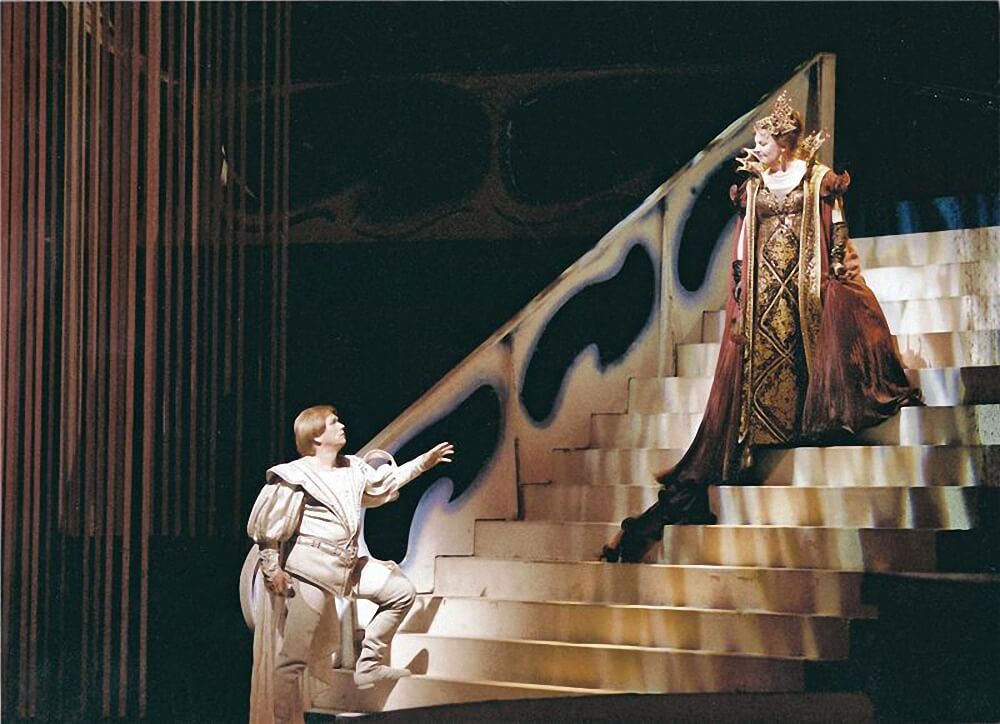
Rusalka | Photo National Theatre
“…his musical staging is the principal advantage of the production. Bělohlávek feels Rusalka in a dramatic way, referring justly to Chalabala’s approach. He puts contrasts into Dvořák’s music especially through tempos, allowing the orchestra to enjoy the slower passages, but also to escalate the excited ones in a manner not often heard – the impressive scene of the Prince and the Foreign Princess ,Vám v očích divný žár se zračí’ is a good example. In order to achieve the intended dramatic effect, Bělohlávek sometimes does not hesitate to lead the singers to accentuate expressive words in an almost declamatory way.”
Seven years later, in September 2005, Jiří Bělohlávek staged Rusalka at the Opéra Bastille in Paris with Olga Guryakova as Rusalka and Stuart Skelton as the Prince. The staging was based on Robert Carsen’s visually spectacular 2002 production.
De la riche écriture orchestrale de Dvořák, le chef Jiří Belohlávek nous donne une lecture généreuse, précise, dont les très subtils équilibres et les accents parfaitement placés ne nuisent jamais à une sorte de spontanéité, de jaillissement qui suit les fluctuations passionnelles de la malheureuse Rusalka.
Conductor Jiří Bělohlávek presents Dvořák’s rich orchestral manuscript in a generous, precise way, in which the delicate balance and precisely placed accents never prevent a certain spontaneity and explosiveness, mirroring thus the transformations of the unfortunate Rusalka.
The year 2009 brought two productions of Rusalka. In March, it was the performance at the Metropolitan Opera in New York with Renée Fleming as Rusalka and the Latvian tenor Aleksandrs Antoņenko as the Prince. And then in the summer, Bělohlávek revisited the Glyndebourne Festival and staged Rusalka together with the English stage director Melly Still, collaborating with the set and costume designer Rae Smith. Rusalka was sung by Ana María Martínez, the Prince by Brandon Jovanovich and Ježibaba by Larissa Diadkova. A live recording was released on CD in 2010.
When assessing Bělohlávek’s musical staging, I could use all superlatives. The refined treatment of details within the clarity of the complexity of his conception of the interpreted work reached its climax. It seems that the perfect playing of every phrase and every ornament is something natural; when listening to such perfect performances, we realize how wonderful the whole is, built and sustained by the conductor, and how amazingly significant are all the changes in tempo and dynamics. The result, then, is a perfectly thought-out musical flow of Dvořák’s musical language. And if I add the fact that the singers sing flawlessly, with voices clearly revealing a reserve in their range, and moreover with their Czech so pure that we do not hear such from opera singers on Czech stages, the experience is dazzling.
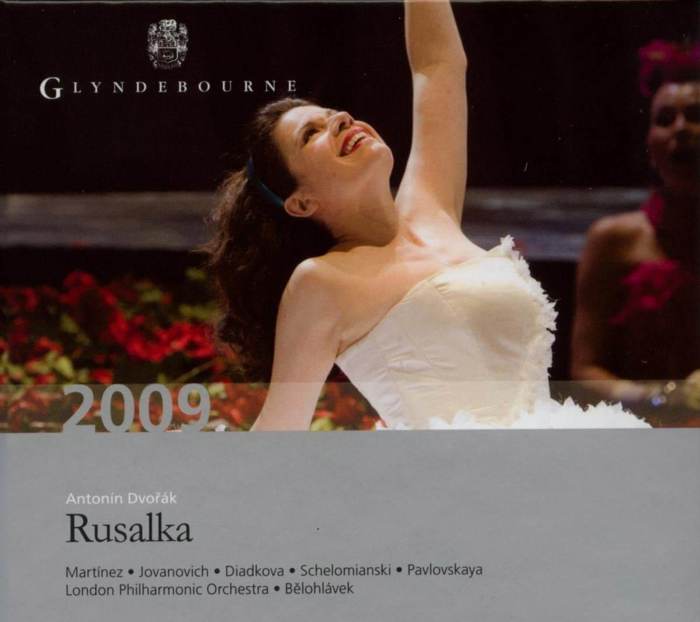
“This live recording of Glyndebourne’s 2009 production of Dvořák’s operatic masterpiece faces hot competition from a classic Decca release (466 3562) with Renée Fleming in the title role, conducted by Charles Mackerras. The strength of Glyndebourne’s performance is Bělohlávek’s conducting – less incisive than Mackerras’s perhaps, but full of warmth, exuberance and humour, and lifting the London Philharmonic to great heights in the tragedy of the final act.”
In 2012 in London, Bělohlávek and the BBC Symphony Orchestra gave a concert performance of The Jacobin. The singing cast was almost only Czech and Slovak, featuring Dana Burešová as Julie, Svatopluk Sem as Bohuš, and Aleš Voráček as Jiří. Other roles were performed by Jaroslav Březina, Lucie Fišer Silkenová, Aleš Jenis, Jozef Benci and Jan Martiník.
Bělohlávek and his mostly Czech cast were in their element with it, too. Bělohlávek has done nothing finer. The singing was consistently sensational: Svatopluk Sem's noble Bohuš, Dana Burešová's Julie, Ales Voráček's plucky Jiří and Jaroslav Březina as the fussy music teacher Benda were particularly outstanding. A joy and a privilege to hear.
Bělohlávek’s last Rusalka was at the State Opera in Vienna in January and February 2014, under the stage direction of Sven-Erik Bechtolf. It was a debut for Bělohlávek at this famous opera house. From among Czech conductors, only Václav Neumann had conducted this opera here, it was in 1987. As fate would have it, both conductors were at a similar stage in their lives and careers: “Fate sometimes repeats itself in a funny way, I also have the honour of leading the Czech Philharmonic, I am the same age as Václav Neumann was then, and this is the first time I have worked with this renowned house, so I feel in good company.” [ 82 ]
The production featured, among others, the Bulgarian soprano Krassimira Stoyanova as Rusalka, Michael Schade as the Prince, Günther Groissböck as Vodník and Janina Baechle as Ježibaba.
The musical execution and exquisite singing are the big reasons this Rusalka was such a resounding success. Conductor Jiří Bĕlohlávek’s expertise with the repertoire is undeniable and the Vienna Philharmonic (under the moniker of ‘Orchester der Wiener Staatsoper’) played absolutely brilliantly under his baton. The music never got stuck or bogged down, as it often can, but flowed and moved easily and idiomatically. Moreover, Bĕlohlávek’s attention to the singers was spectacular. When the three water sprites got a little over-excited in the third act, he reined them in and restored order before the audience could even start to wonder if there was something going on. He cued the principles consistently and simultaneously brought out some very clean, beautiful solo and ensemble work from the orchestra.
Grundlage Nummer eins des vollständigen Hörglücks, das die Premiere der ‘Rusalka’ dem Publikum beschert hat, ist also der philharmonische Klang, den Staatsopern-Debütant Jiří Bělohlávek umsichtig im Sinne der Partitur und des rechten Dvořák-Stils zu kanalisieren weiß: Bělohlávek ist ein weit gereister Maestro in Sachen ‘Rusalka’ und weiß vor allem, dass eines der großen Geheimnisse guter Dvořák-Interpretationen ist, sich nicht auf ‘schönen Stellen’ auszuruhen, sondern ein Tempo zu halten.
Reason number one for this wonderful experience, which the audience at the premiere of Rusalka undoubtedly had, was the philharmonic sound, which Jiří Bělohlávek, making his debut at the Staatsoper, knows how to channel in such a way as to honour the score as well as the appropriate Dvořák style. Bělohlávek is a well-experienced maestro in matters of Rusalka and knows very well that one of the great secrets of good Dvořák interpretations is not to rest on “beautiful passages”, but to keep the tempo.
Jiří Bělohlávek on Rusalka
Excerpts from an interview made on the occasion of staging Rusalka at the State Opera Vienna.
Rusalka has a subtitle - A lyrical fairy tale. Does such a genre placement tell us anything about the musical structure of the opera?
I see Rusalka not only as a lyrical fairy tale, but also as a huge inner drama. The whole conception of the opera is built in such a way as to clearly show its archetypal composition – or to put it more precisely, all four main characters represent archetypes of different qualities. Rusalka embodies the principle of love and absolute devotedness to the beloved person, the Prince is a contrasting archetype of a passionate but superficial lover, Vodník represents justice and fatherly love, and Ježibaba represents mysterious forces that set the story in motion.
How much Czech is the music in Rusalka?
Dvořák wrote Rusalka at the height of his career – this opera is for me one of his most significant works, if not the most significant one. And in my opinion, the Czech character is present in it absolutely – on every single page of the score.
What is characteristic of Dvořák’s late style?
Rusalka was composed in 1900 in a very short time – within six months. Shortly before that, Dvořák published four symphonic poems that are, one could say, a kind of study for Rusalka, and which, as far as orchestral sound colours are concerned, constitute the climax of his art of composition. In Rusalka, his mastery of instrumentation with combinations of colours full of shades and nuances finally reached perfection.
Is there anything programmatic about Rusalka in the harmonic and melodic ways?
In addition to the harmonic material, Rusalka contains a certain thematic material attributed to the main characters. Not a leitmotif in the Wagnerian sense of the word, we rather find here a certain form of characterisation which expresses each situation musically.
Operas by foreign composers
|
1979 |
Igor Fyodorovich Stravinsky The Rake’s Progress |
Berlin Comic Opera, Germany |
|
|
1998 |
Wolfgang Amadeus Mozart Così fan tutte |
National Theatre – Estates Theatre, Prague, Czech Republic |
|
|
1999 |
Georges Bizet Carmen |
National Theatre – Estates Theatre, Prague, Czech Republic |
|
|
2003 |
Richard Wagner Tristan und Isolde |
Glyndebourne, UK |
|
|
2006 |
Wolfgang Amadeus Mozart Così fan tutte |
PKF – Prague Philharmonia, Prague, Czech Republic PKF – Prague Philharmonia, Valencia, Spain |
Concert performance |
|
2007 |
Richard Wagner Tristan und Isolde |
Glyndebourne, UK Baden-Baden, Germany |
|
|
2008 |
Pyotr Ilyich Tchaikovsky Eugene Onegin |
London, Covent Garden, UK |
|
|
2009 |
Pyotr Ilyich Tchaikovsky Eugene Onegin |
Metropolitan opera, New York, USA |
|
|
2014 |
Pyotr Ilyich Tchaikovsky The Queen of Spades |
Zurich Opera House, Switzerland |
|
Of the operas by foreign composers, Jiří Bělohlávek staged, in addition to the above-mentioned The Rake’s Progress by Igor Fyodorovich Stravinsky, operas by Wolfgang Amadeus Mozart, Georges Bizet, Richard Wagner and Peter Ilyich Tchaikovsky.
Bělohlávek got his first experience conducting Mozart’s operas already during his studies at the Academy of Performing Arts in Prague. With students of the singing department and the orchestra of the Smetana Theatre (now State Opera Prague), he performed The Marriage of Figaro. He performed only one Mozart opera on a professional stage, Così fan tutte, directed by Michael Sturm, with the National Theatre in Prague ensemble. The premiere took place in June 1998 at the Estates Theatre. He performed Mozart’s opera also with the PKF – Prague Philharmonia when in 2006 he conducted two concert performances of Così fan tutte within the celebrations of the 250th anniversary of Wolfgang Amadeus Mozart’s birth. On 26 November, they performed it at the Rudolfinum and on 2 December at the Palau de la Música in Valencia. The singing parts were performed by the Prague Chamber Choir with Pavel Vaněk as the chorus-master, and soloists Martina Zadro (Fiordiligi), Jana Štefáčková (Dorabella), Radka Sehnoutková (Despina), Tomáš Kořínek (Ferrando), Roman Janál (Guglielmo) and Dali Mor (Don Alfonso).
I consider Così fan tutte to be a work of genius and, from the musical point of view, an absolute treasure. I understand the problems, it is a comic opera and at the same time it speaks about the unpleasant fact of men and women often not being sincere to each other. It is an opera where all heroes fail. Nevertheless, the comic hyperbole and detachment in the musical component lifts it to exquisite entertainment and delight.
At the National Theatre, Bělohlávek staged also Bizet’s Carmen. The production, directed by Jozef Bednárik and featuring Dagmar Pecková as Carmen had its premiere in 1999. More than forty years after he sang in this opera with the Prague Philharmonic Children’s Choir, Bělohlávek could revisit it, this time from a different place, the orchestra pit.
“I remember to this day how completely paralyzed and enchanted I was when I first stood on the stage of the then Smetana Theatre, aged ten or twelve. We were singing in Bizet’s Carmen. And when, at the end of the fourth act, the whole ensemble started thundering, it was a tremendous experience.” [ 86 ]
Under Jiří Bělohlávek’s baton, the orchestra shined once again after a longer period of time – within its limits. It is remarkable how the conductor can arouse the working enthusiasm of almost all the players (a closer look at the orchestra will show you) and how they try to give their best during the evening... The orchestra simply plays one level better under Bělohlávek, stepping out of its shadow. It is surely a result of the conductor’s authority, based on his relentless demands and artistic honesty that has been rightly associated with his name for many years
In 2003, Bělohlávek conducted at the Glyndebourne Festival, this time Wagner’s monumental Tristan und Isolde, directed by Nikolaus Lehnhoff. It was a Wagnerian premiere, both for Bělohlávek and for the festival. The ten performances were received enthusiastically, so it was decided to renew the production in 2007 with almost an identical cast, including the conductor and the London Philharmonic Orchestra. These productions were captured on camera by the Opus Arte recording team and a live recording of the performance was released on a DVD the following year.
The overall unconditional success of the musical component of the production was based on three elements: the conductor’s vision, the orchestra players’ ability to follow the vision and the fascinating Isolde performed by the Swedish soprano Nina Stemme. The outcome of the conductor’s construction did not pursue anything external, be it in the sphere of dynamics or expressive accentuation of individual roles. In principle, it allowed the orchestra to reach climaxes and overflow, unless it accompanied the singers, and even when accompanying them, Bělohlávek masterfully arched a countless row of climaxes and their gentle returns into a silenced, dynamically appropriate ‘accompaniment’, never drowning out the singers. (…) The London Philharmonic Orchestra managed to fulfil all the nuances of Bělohlávek’s vision and specific demands in an incredibly responsive way, with clarity of expression, professional preparation and an audible desire to build this huge work to his gesture.
Conductor Jiří Bělohlávek makes details shine, while always keeping control of the big picture. Yet, like almost everyone on this production, this was his ‘Tristan’ debut.
Bělohlávek was supposed to conduct Tristan und Isolde also in January and February 2013 at the Canadian Opera Company in Toronto, with Marek Šedivý as the assistant conductor. Due to health problems, however, he could not take part.
The last non-Czech opera composer whose work Bělohlávek conducted at famous opera houses in the world was Pyotr Ilyich Tchaikovsky. In 2008, he staged Eugene Onegin at the Royal Opera House, Covent Garden, featuring the Russian soprano Hibla Gerzmava as Tatiana and the Canadian baritone Gerald Finley as Eugene. Olga was performed by Ekaterina Semenchuk and Lenski by Piotr Beczala. Bělohlávek performed Eugene Onegin also less than a year later, in January and February 2009, at the Metropolitan Opera in New York. The production was directed by Robert Carsen, with Onegin performed by the American baritone Thomas Hampson and Tatiana by the soprano Karita Mattila.
As beautiful as the visual aspects of this production were, the music is, of course, paramount and the entire company performed it brilliantly. Bělohlávek was masterful in his interpretation of the score. His tempos were flawless, and in the various introductory passages he created just the right atmosphere for each scene. Tchaikovsky was arguably the greatest of all composers of orchestral dance music and dancing pervades ‘Eugene Onegin’. Bělohlávek captured the spirit of each of Tchaikovsky’s dance scenes: the schottische was danced brilliantly by Linda Gelinas and Sam Meredith. The Met Orchestra performed with its usual excellence, enlivening the performance with many outstanding solo passages. Particularly memorable were the solo oboe and horn in the crucial 'Letter Scene' in Act One and haunting clarinet solos accompanying Lenski's Act Two aria.
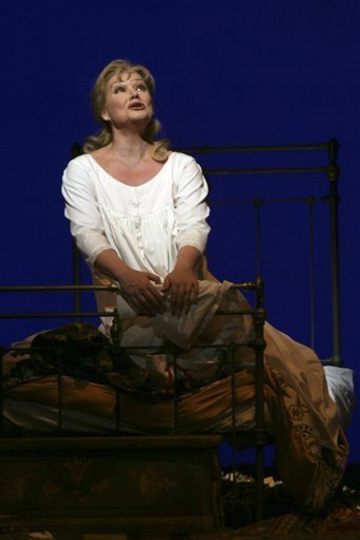
Bělohlávek’s second opera production of Tchaikovsky was The Queen of Spades, directed again by Robert Carsen. The premiere took place on 6 April 2014 at the Zurich Opera House.
La réussite de la soirée tient aussi à la formidable direction de Jiri Belohlavek qui campe d’admirables ambiances suspendues dans les préludes (ou dans la scène entre Pauline et Lisa) mais sait aussi maintenir une tension dramatique très excitante quand il le faut. L’orchestre affiche de belles couleurs, notamment la petite harmonie, mais pêche un peu dans les pupitres de violons.
The success of the evening is also due to the formidable conducting of Jiri Belohlavek who creates beautifully suspended atmospheres in the preludes (or in the scene between Pauline and Lisa) but also knows how to maintain a very exciting dramatic tension when it is necessary. The orchestra displays beautiful colours, especially in the wind instruments.
Mit bezwingendem dramatischem Zugriff braust Jiri Belohlávek durch die Partitur, doch bleibt die Balance zwischen Graben und Bühne stets ausgewogen, die Sänger sind zwar durchaus laut zu vernehmen, aber brauchen nicht über iher stimmlichen Möglichkeiten hinaus zu forcieren. Starke Aufführung einer meisterhaften Oper.
Jiří Bělohlávek roars through the score with his typically captivating, dramatic approach, while keeping the balance between the orchestra and the stage masterfully, the singers can always be heard well without needing to go beyond their vocal capabilities. A powerful performance of a masterful opera.
Main sources
- 1.
RETKOVÁ, Marie: Jiří Bělohlávek chce prezentovat Českou filharmonii jako všestranné hudební těleso. Český rozhlas Vltava 2012 (21. 12.) Dostupné online
- 2.
KOLÁČKOVÁ, Yvetta: Jiří Bělohlávek 60. O sobě, rodině a hudbě. Rudolfinum revue 5, 2005–2006, č. 3, s. s. 24–28.
- 3.
MALÁ, Hana: Figarova svatba posluchačů AMU. Hudební rozhledy 1972, č. 8, s. 345.
- 4.
md: Jiří Bělohlávek – operní dirigent. Tvorba: list pro kritiku a umění 1979, č. 25, s. 19.
- 5.
SPISAROVÁ, Renáta; MAREŠOVÁ, Milena M.: Jiří Bělohlávek diriguje New York Philharmonic. Český rozhlas Vltava 2016, 9. 12. Available online
- 6.
Vnesl do filharmonie zázrak, vzpomíná na Bělohlávka šéf brněnské opery. Lidovky.cz 2017, 1. 6. Available online
- 7.
VEBER, Petr; STEHLÍK, Luboš: Jiří Bělohlávek: Fluidum, nebo práce? Harmonie.cz 2018. 31. 5. Available online
- 8.
JIRKŮ, Irena: Možná to byl úkol. A čekal tady právě na mě, říká bankéřka Ivana Leidlová, která obnovuje zámek Liteň i slávu operní pěvkyně Jarmily. iHned.cz 2018, 16. 11. Available online
- 9.
SRSTKA, Jiří: Opera a Jiří Bělohlávek. OperaPlus.cz 2017. 6. 6. Available online
- 10.
BERNHEIMER, Martin: Janacek in the Pacific Northwest. Los Angeles Times 1985. Available online
- 11.
WOHLFAHRT, Hans-Theodor: Janáček Jenufa Glyndebourne Festival Opera, 21 May 2000. Musicweb International 2000, 22. 5. Available online
- 12.
ZAHRÁDKA, Jiří: Wilson proti osudu. Respekt 13, 2002, č. 18, s. 22.
- 13.
VEBER, Petr: Jiří Bělohlávek uvádí v Londýně hodně české hudby. Český rozhlas D dur 2008, 3. 9. Available online
- 14.
ZAHRÁDKA, Jiří: Wilson proti osudu. Respekt 13, 2002, č. 18, s. 22.
- 15.
GRENARD, Benjamin: La quintessence de Janáček. Altamusica.com 2004, 6. 11. Available online
- 16.
TOMMASINI, Anthony: Met Opera Review: A Love Triangle Contorted by Authority Figures. New York Times 2004, 20.12, sekce E, s. 5. Available online
- 17.
TOMMASINI, Anthony: Big Trouble for a Small-Town Ingénue. New York Times 2007, 31.1., sekce E, s. 1. Available online
- 18.
MCGREGOR, Andrew: Leoš Janáček The Excursions Of Mr Brouček Review. BBC 2008. Available online
- 19.
IRURZUN, José M.: Janacek, Katia Kabanova: Soloists, Orquesta y Coro de la Sinfónica de Madrid. Conductor: Jiri Belohlavek. Teatro Real de Madrid. 2 & 4.12.2008. Musicweb 2008, Available online
- 20.
VEBER, Petr: Světový Janáček: Carsenova Káťa Kabanová v rukou Jiřího Bělohlávka. KlasikaPlus.cz 2018, 16. 12. Available online
- 21.
MERMELSTEIN, David: Opera's Drama Queen. The Wall Street Journal 2012, 25. 4. Available online
- 22.
ULRICH, Allan: The Makropulos Case, War Memorial Opera House, San Francisco. Financial Times 2010, 11. 11. Available online
- 23.
MILENSKI, Michael: The Makropulos Case in San Francisco. Operatoday 2010, 20. 11. Available online
- 24.
LITTLEHOHN, David: Janáček Saves a Season. The Wall Street Journal 2010, 23. 11. Available online
- 25.
FONSECA-WOLLHEIM, Corinna da: Mattila provides ageless artistry in Met’s masterful “Makropulos Case”. The Classical Review 2012, 30. 4. Available online
- 26.
BERNHEIMER, Martin: The Makropulos Case, Metropolitan Opera, New York. Financial Times 2012, 30. 4. Available online
- 27.
ULRICH, Allan: The Makropulos Case, War Memorial Opera House, San Francisco. Financial Times 2010, 11. 11. Available online
- 28.
MILENSKI, Michael: The Makropulos Case in San Francisco. Operatoday 2010, 20. 11. Available online
- 29.
LITTLEHOHN, David: Janáček Saves a Season. The Wall Street Journal 2010, 23. 11. Available online
- 30.
FONSECA-WOLLHEIM, Corinna da: Mattila provides ageless artistry in Met’s masterful “Makropulos Case”. The Classical Review 2012, 30. 4. Available online
- 31.
BERNHEIMER, Martin: The Makropulos Case, Metropolitan Opera, New York. Financial Times 2012, 30. 4. Available online
- 32.
VEBER, Petr: Recenze: Její pastorkyňa v podání České filharmonie byla mimořádná jako kdysi Neumannovy večery. iHned 2016, 16. 4. Available online
- 33.
ASHLAY, Tim: Jenůfa review – formidable Mattila is devastating as the Kostelnička. The Guardian 2016, 19. 4. Available online
- 34.
Beauty, pain and reflection: Jenůfa at San Francisco Opera. Operatraveller.com 2016, 16. 6. Available online
- 35.
KOSMAN, Joshua: ‘Jenufa’ is a triumph for Mattila, SF Opera. San Francisco Gate 2016, 15. 6. Available online
- 36.
STOERING, Donna: SF Opera's Jenůfa glows with radiant performances. Bachtrack.com 2016, 15. 6. Available online
- 37.
ROWE, Georgia: Review: ‘Jenufa’ a triumph for S.F. Opera. Mercury News 2016, 15. 6. Available online
- 38.
Beauty, pain and reflection: Jenůfa at San Francisco Opera. Operatraveller.com 2016, 16. 6. Available online
- 39.
KOSMAN, Joshua: ‘Jenufa’ is a triumph for Mattila, SF Opera. San Francisco Gate 2016, 15. 6. Available online
- 40.
STOERING, Donna: SF Opera's Jenůfa glows with radiant performances. Bachtrack.com 2016, 15. 6. Available online
- 41.
ROWE, Georgia: Review: ‘Jenufa’ a triumph for S.F. Opera. Mercury News 2016, 15. 6. Available online
- 42.
OZORIO, Anne: BBC Prom 45 - Janáček: The Makropulos Affair. Opera Today 2016, 22. 8. Available online
- 43.
Hry o Marii. Harmonie 2009. Available online
- 44.
HERMANNOVÁ, Eva: Staronové pašije ve Smetanově divadle. Tvorba 1984, č. 10 (7. 3.), s. 10.
- 45.
MANNONI, Gérard: Une Juliette de rêve. Altamusica.com 2006, 10. 2. Available online
- 46.
VÍTOVÁ, Eva: Řecké pašije konečně v Národním. Harmonie 14, 2006, č. 6, s. 34
- 47.
CLARKE, Colin: Martinů, Juliette. Music Web International 2009. Available online
- 48.
DVOŘÁK, Vít: Opulentní Hry o Marii. OPERA Plus 2009, 30. 10. Available online
- 49.
VEBER, Petr: Hry o Marii vynášejí soubor Národního divadla na operní nebe. Ihned 2009, 2. 11. Available online
- 50.
HRDINOVÁ, Radmila: Vášeň dřímající v puklinách šedých stěn. K Pountneyho režii Čertovy stěny. Svět a divadlo 13, 2002, č. 1, s. 62–67.
- 51.
BRAUNOVÁ, Dana: Jiří Bělohlávek: Intenzívní a důsledná práce je jedinou cestou k úspěchu. Novinky.cz 2012, 19. 11. Available online
- 52.
LESUEUR, François: La fiancée vendue – Paris (Garnier). Forumopera.com 2008, 22. 10. Available online
- 53.
PÉNAVAYRE, Robert: La petite Fiancée du peuple tchèque. Classic Toulouse 2008, 14. 10. Available online
- 54.
LESUEUR, François: La fiancée vendue – Paris (Garnier). Forumopera.com 2008, 22. 10. Available online
- 55.
PÉNAVAYRE, Robert: La petite Fiancée du peuple tchèque. Classic Toulouse 2008, 14. 10. Available online
- 56.
HAVLÍKOVÁ, Helena: Paříž a Smetana s Janáčkem. Hudební rozhledy2009, č. 1, s. 36–37.
- 57.
FINCH, Hilary: The Bartered Bride at the Barbican, London EC2. The Times 2011, 28. 5. Available online
- 58.
FINCH, Hilary: The Bartered Bride at the Barbican, London EC2. The Times 2011, 28. 5. Available online
- 59.
DIXON, Gavin: Smetana: The Bartered Bride, Bělohlávek, BBC SO. Classical-cd-reviews.com 2012, 27. 9. Available online
- 60.
WRIGHT, Leslie: Bedřich Smetana: The Bartered Bride. MusicWeb 2013, 13. 1. Available online
- 61.
VEBER, Petr: Dirigent Jiří Bělohlávek hovoří o Smetanově opeře Dalibor. Český rozhlas D-dur 2015, 25. 9. Available online
- 62.
ROUČEK, Rudolf: Triumf Smetanova Dalibora v Londýně. Harmonie 2015. Available online
- 63.
MOFFATT, Steve: Smetana: Dalibor (BBC Symphony Orchestra/Jiri Belohlavek). LimeLight 2016, 19. 8. Available online
- 64.
ŠUPKA, Ondřej: Reflexe Dvořákovy a Kvapilovy Rusalky. Diplomová práce. Masarykova univerzita Brno, 2011, s. 40. Available online
- 65.
SOMEŠ, Jaroslav: Dočkali jsme se Rusalky. Hudební rozhledy 1998, č. 11, s. 32–33.
- 66.
SOMEŠ, Jaroslav: Dočkali jsme se Rusalky. Hudební rozhledy 1998, č. 11, s. 32–33.
- 67.
MANNONI, Gérard: Le feu sous la glace. Altamusica.com 2005, 14. 9. Available online
- 68.
SMITH, Steve: A Fetching Water Nymph Pursuing Love in a Fairy Tale From Dvorak. The New York Times 2010, sekce C7. Available online
- 69.
WOODS, John: Dvořák: Rusalka. MusicalCriticism.com 2009, 17. 3. Available online
- 70.
SECKERSON, Edward: Dvorak Rusalka, Glyndebourne Festival Opera, East Sussex. Independent 2009, 6. 7. Available online
- 71.
JEAL, Erica: Rusalka. The Guardian 2009, 6. 7. Available online
- 72.
SMITH, Steve: A Fetching Water Nymph Pursuing Love in a Fairy Tale From Dvorak. The New York Times 2010, sekce C7. Available online
- 73.
WOODS, John: Dvořák: Rusalka. MusicalCriticism.com 2009, 17. 3. Available online
- 74.
SECKERSON, Edward: Dvorak Rusalka, Glyndebourne Festival Opera, East Sussex. Independent 2009, 6. 7. Available online
- 75.
JEAL, Erica: Rusalka. The Guardian 2009, 6. 7. Available online
- 76.
VÍTOVÁ, Eva: Glyndebourne – Rusalka. Harmonie 2009, č. 11, s. 37–38. Available online
- 77.
CHRISTIANSEN, Rupert: Dvořák: Rusalka, CD review. The Telegraph 2010, 1. 6. Available online
- 78.
CANNING, Hugh: Dvorak – Rusalka. The Times 2010, 6. 6. Available online
- 79.
CHRISTIANSEN, Rupert: Dvořák: Rusalka, CD review. The Telegraph 2010, 1. 6. Available online
- 80.
CANNING, Hugh: Dvorak – Rusalka. The Times 2010, 6. 6. Available online
- 81.
ASHLEY, Tim: The Jacobin – review. The Guardian 2012, 5. 2. Available online
- 82.
DRÁPELOVÁ, Věra: Bělohlávek jde s Rusalkou ve stopách legendárního dirigenta Neumanna. iDNES 2014, 25. 1. Available online
- 83.
VANDERHART, Chanda: Stoyanova shines in Bechtolf's dark, fantastical Rusalka at the Vienna Staatsoper. Bachtrack 2014, 31. 1. Available online
- 84.
SINKOVICZ, Wilhelm: Staatsoper: „Rusalka“, eine akustische Sternstunde. Die Presse 2014, 28. 1. Available online
- 85.
BÁLEK, Jindřich: Jiří Bělohlávek – ohlédnutí za zájezdem České filharmonie do Anglie. Český rozhlas Vltava 2006, 28. 11. Available online
- 86.
PLAVCOVÁ, Alena: Jiří Bělohlávek: Maestro. Pátek. Magazín Lidových novin 2005, č. 16, s. 4–10. Also available online
- 87.
ŽÁČEK, Ivan: Svižné Così fan tutte ve Stavovském. Svět a divadlo 1998, č. 5, s. 82–85.
- 88.
VÍTOVÁ, Eva: Wagnerovský debut Jiřího Bělohlávka. Harmonie 2003, 18. 9. Available online
- 89.
HOELTERHOFF, Manuela: Love and Death. The Wall Street Journal 2003, 22. 5. Available online
- 90.
RICE, David M.: The Metropolitan Opera – Eugene Onegin [Mattila & Hampson]. Classical Source 2009. Available online
- 91.
LAPHAY, Pierre-Emmanuel: La Dame de Pique – Zurich. Forumopera.com 2014, 11. 4., Available online
- 92.
SANNEMANN, Kaspar: Zürich: Pique Dame, 06.04. & 16.4.2014. Oper-aktuell 2014, 16. 4. Available online
RETKOVÁ, Marie: Jiří Bělohlávek chce prezentovat Českou filharmonii jako všestranné hudební těleso. Český rozhlas Vltava 2012 (21. 12.) Dostupné online
KOLÁČKOVÁ, Yvetta: Jiří Bělohlávek 60. O sobě, rodině a hudbě. Rudolfinum revue 5, 2005–2006, č. 3, s. s. 24–28.
MALÁ, Hana: Figarova svatba posluchačů AMU. Hudební rozhledy 1972, č. 8, s. 345.
md: Jiří Bělohlávek – operní dirigent. Tvorba: list pro kritiku a umění 1979, č. 25, s. 19.
SPISAROVÁ, Renáta; MAREŠOVÁ, Milena M.: Jiří Bělohlávek diriguje New York Philharmonic. Český rozhlas Vltava 2016, 9. 12. Available online
Vnesl do filharmonie zázrak, vzpomíná na Bělohlávka šéf brněnské opery. Lidovky.cz 2017, 1. 6. Available online
VEBER, Petr; STEHLÍK, Luboš: Jiří Bělohlávek: Fluidum, nebo práce? Harmonie.cz 2018. 31. 5. Available online
JIRKŮ, Irena: Možná to byl úkol. A čekal tady právě na mě, říká bankéřka Ivana Leidlová, která obnovuje zámek Liteň i slávu operní pěvkyně Jarmily. iHned.cz 2018, 16. 11. Available online
SRSTKA, Jiří: Opera a Jiří Bělohlávek. OperaPlus.cz 2017. 6. 6. Available online
BERNHEIMER, Martin: Janacek in the Pacific Northwest. Los Angeles Times 1985. Available online
WOHLFAHRT, Hans-Theodor: Janáček Jenufa Glyndebourne Festival Opera, 21 May 2000. Musicweb International 2000, 22. 5. Available online
ZAHRÁDKA, Jiří: Wilson proti osudu. Respekt 13, 2002, č. 18, s. 22.
VEBER, Petr: Jiří Bělohlávek uvádí v Londýně hodně české hudby. Český rozhlas D dur 2008, 3. 9. Available online
ZAHRÁDKA, Jiří: Wilson proti osudu. Respekt 13, 2002, č. 18, s. 22.
GRENARD, Benjamin: La quintessence de Janáček. Altamusica.com 2004, 6. 11. Available online
TOMMASINI, Anthony: Met Opera Review: A Love Triangle Contorted by Authority Figures. New York Times 2004, 20.12, sekce E, s. 5. Available online
TOMMASINI, Anthony: Big Trouble for a Small-Town Ingénue. New York Times 2007, 31.1., sekce E, s. 1. Available online
MCGREGOR, Andrew: Leoš Janáček The Excursions Of Mr Brouček Review. BBC 2008. Available online
IRURZUN, José M.: Janacek, Katia Kabanova: Soloists, Orquesta y Coro de la Sinfónica de Madrid. Conductor: Jiri Belohlavek. Teatro Real de Madrid. 2 & 4.12.2008. Musicweb 2008, Available online
VEBER, Petr: Světový Janáček: Carsenova Káťa Kabanová v rukou Jiřího Bělohlávka. KlasikaPlus.cz 2018, 16. 12. Available online
MERMELSTEIN, David: Opera's Drama Queen. The Wall Street Journal 2012, 25. 4. Available online
ULRICH, Allan: The Makropulos Case, War Memorial Opera House, San Francisco. Financial Times 2010, 11. 11. Available online
MILENSKI, Michael: The Makropulos Case in San Francisco. Operatoday 2010, 20. 11. Available online
LITTLEHOHN, David: Janáček Saves a Season. The Wall Street Journal 2010, 23. 11. Available online
FONSECA-WOLLHEIM, Corinna da: Mattila provides ageless artistry in Met’s masterful “Makropulos Case”. The Classical Review 2012, 30. 4. Available online
BERNHEIMER, Martin: The Makropulos Case, Metropolitan Opera, New York. Financial Times 2012, 30. 4. Available online
ULRICH, Allan: The Makropulos Case, War Memorial Opera House, San Francisco. Financial Times 2010, 11. 11. Available online
MILENSKI, Michael: The Makropulos Case in San Francisco. Operatoday 2010, 20. 11. Available online
LITTLEHOHN, David: Janáček Saves a Season. The Wall Street Journal 2010, 23. 11. Available online
FONSECA-WOLLHEIM, Corinna da: Mattila provides ageless artistry in Met’s masterful “Makropulos Case”. The Classical Review 2012, 30. 4. Available online
BERNHEIMER, Martin: The Makropulos Case, Metropolitan Opera, New York. Financial Times 2012, 30. 4. Available online
VEBER, Petr: Recenze: Její pastorkyňa v podání České filharmonie byla mimořádná jako kdysi Neumannovy večery. iHned 2016, 16. 4. Available online
ASHLAY, Tim: Jenůfa review – formidable Mattila is devastating as the Kostelnička. The Guardian 2016, 19. 4. Available online
Beauty, pain and reflection: Jenůfa at San Francisco Opera. Operatraveller.com 2016, 16. 6. Available online
KOSMAN, Joshua: ‘Jenufa’ is a triumph for Mattila, SF Opera. San Francisco Gate 2016, 15. 6. Available online
STOERING, Donna: SF Opera's Jenůfa glows with radiant performances. Bachtrack.com 2016, 15. 6. Available online
ROWE, Georgia: Review: ‘Jenufa’ a triumph for S.F. Opera. Mercury News 2016, 15. 6. Available online
Beauty, pain and reflection: Jenůfa at San Francisco Opera. Operatraveller.com 2016, 16. 6. Available online
KOSMAN, Joshua: ‘Jenufa’ is a triumph for Mattila, SF Opera. San Francisco Gate 2016, 15. 6. Available online
STOERING, Donna: SF Opera's Jenůfa glows with radiant performances. Bachtrack.com 2016, 15. 6. Available online
ROWE, Georgia: Review: ‘Jenufa’ a triumph for S.F. Opera. Mercury News 2016, 15. 6. Available online
OZORIO, Anne: BBC Prom 45 - Janáček: The Makropulos Affair. Opera Today 2016, 22. 8. Available online
Hry o Marii. Harmonie 2009. Available online
HERMANNOVÁ, Eva: Staronové pašije ve Smetanově divadle. Tvorba 1984, č. 10 (7. 3.), s. 10.
MANNONI, Gérard: Une Juliette de rêve. Altamusica.com 2006, 10. 2. Available online
VÍTOVÁ, Eva: Řecké pašije konečně v Národním. Harmonie 14, 2006, č. 6, s. 34
CLARKE, Colin: Martinů, Juliette. Music Web International 2009. Available online
DVOŘÁK, Vít: Opulentní Hry o Marii. OPERA Plus 2009, 30. 10. Available online
VEBER, Petr: Hry o Marii vynášejí soubor Národního divadla na operní nebe. Ihned 2009, 2. 11. Available online
HRDINOVÁ, Radmila: Vášeň dřímající v puklinách šedých stěn. K Pountneyho režii Čertovy stěny. Svět a divadlo 13, 2002, č. 1, s. 62–67.
BRAUNOVÁ, Dana: Jiří Bělohlávek: Intenzívní a důsledná práce je jedinou cestou k úspěchu. Novinky.cz 2012, 19. 11. Available online
LESUEUR, François: La fiancée vendue – Paris (Garnier). Forumopera.com 2008, 22. 10. Available online
PÉNAVAYRE, Robert: La petite Fiancée du peuple tchèque. Classic Toulouse 2008, 14. 10. Available online
LESUEUR, François: La fiancée vendue – Paris (Garnier). Forumopera.com 2008, 22. 10. Available online
PÉNAVAYRE, Robert: La petite Fiancée du peuple tchèque. Classic Toulouse 2008, 14. 10. Available online
HAVLÍKOVÁ, Helena: Paříž a Smetana s Janáčkem. Hudební rozhledy2009, č. 1, s. 36–37.
FINCH, Hilary: The Bartered Bride at the Barbican, London EC2. The Times 2011, 28. 5. Available online
FINCH, Hilary: The Bartered Bride at the Barbican, London EC2. The Times 2011, 28. 5. Available online
DIXON, Gavin: Smetana: The Bartered Bride, Bělohlávek, BBC SO. Classical-cd-reviews.com 2012, 27. 9. Available online
WRIGHT, Leslie: Bedřich Smetana: The Bartered Bride. MusicWeb 2013, 13. 1. Available online
VEBER, Petr: Dirigent Jiří Bělohlávek hovoří o Smetanově opeře Dalibor. Český rozhlas D-dur 2015, 25. 9. Available online
ROUČEK, Rudolf: Triumf Smetanova Dalibora v Londýně. Harmonie 2015. Available online
MOFFATT, Steve: Smetana: Dalibor (BBC Symphony Orchestra/Jiri Belohlavek). LimeLight 2016, 19. 8. Available online
ŠUPKA, Ondřej: Reflexe Dvořákovy a Kvapilovy Rusalky. Diplomová práce. Masarykova univerzita Brno, 2011, s. 40. Available online
SOMEŠ, Jaroslav: Dočkali jsme se Rusalky. Hudební rozhledy 1998, č. 11, s. 32–33.
SOMEŠ, Jaroslav: Dočkali jsme se Rusalky. Hudební rozhledy 1998, č. 11, s. 32–33.
MANNONI, Gérard: Le feu sous la glace. Altamusica.com 2005, 14. 9. Available online
SMITH, Steve: A Fetching Water Nymph Pursuing Love in a Fairy Tale From Dvorak. The New York Times 2010, sekce C7. Available online
WOODS, John: Dvořák: Rusalka. MusicalCriticism.com 2009, 17. 3. Available online
SECKERSON, Edward: Dvorak Rusalka, Glyndebourne Festival Opera, East Sussex. Independent 2009, 6. 7. Available online
JEAL, Erica: Rusalka. The Guardian 2009, 6. 7. Available online
SMITH, Steve: A Fetching Water Nymph Pursuing Love in a Fairy Tale From Dvorak. The New York Times 2010, sekce C7. Available online
WOODS, John: Dvořák: Rusalka. MusicalCriticism.com 2009, 17. 3. Available online
SECKERSON, Edward: Dvorak Rusalka, Glyndebourne Festival Opera, East Sussex. Independent 2009, 6. 7. Available online
JEAL, Erica: Rusalka. The Guardian 2009, 6. 7. Available online
VÍTOVÁ, Eva: Glyndebourne – Rusalka. Harmonie 2009, č. 11, s. 37–38. Available online
CHRISTIANSEN, Rupert: Dvořák: Rusalka, CD review. The Telegraph 2010, 1. 6. Available online
CANNING, Hugh: Dvorak – Rusalka. The Times 2010, 6. 6. Available online
CHRISTIANSEN, Rupert: Dvořák: Rusalka, CD review. The Telegraph 2010, 1. 6. Available online
CANNING, Hugh: Dvorak – Rusalka. The Times 2010, 6. 6. Available online
ASHLEY, Tim: The Jacobin – review. The Guardian 2012, 5. 2. Available online
DRÁPELOVÁ, Věra: Bělohlávek jde s Rusalkou ve stopách legendárního dirigenta Neumanna. iDNES 2014, 25. 1. Available online
VANDERHART, Chanda: Stoyanova shines in Bechtolf's dark, fantastical Rusalka at the Vienna Staatsoper. Bachtrack 2014, 31. 1. Available online
SINKOVICZ, Wilhelm: Staatsoper: „Rusalka“, eine akustische Sternstunde. Die Presse 2014, 28. 1. Available online
BÁLEK, Jindřich: Jiří Bělohlávek – ohlédnutí za zájezdem České filharmonie do Anglie. Český rozhlas Vltava 2006, 28. 11. Available online
PLAVCOVÁ, Alena: Jiří Bělohlávek: Maestro. Pátek. Magazín Lidových novin 2005, č. 16, s. 4–10. Also available online
ŽÁČEK, Ivan: Svižné Così fan tutte ve Stavovském. Svět a divadlo 1998, č. 5, s. 82–85.
VÍTOVÁ, Eva: Wagnerovský debut Jiřího Bělohlávka. Harmonie 2003, 18. 9. Available online
HOELTERHOFF, Manuela: Love and Death. The Wall Street Journal 2003, 22. 5. Available online
RICE, David M.: The Metropolitan Opera – Eugene Onegin [Mattila & Hampson]. Classical Source 2009. Available online
LAPHAY, Pierre-Emmanuel: La Dame de Pique – Zurich. Forumopera.com 2014, 11. 4., Available online
SANNEMANN, Kaspar: Zürich: Pique Dame, 06.04. & 16.4.2014. Oper-aktuell 2014, 16. 4. Available online
